Kalinin Mikhail Ivanovich
Definition: Chairman of the Central Executive Committee of the USSR
Years of life: 1875 - 1946
Reproduction methods:
Mikhail Kalinin was born in the village of Upper Troitsa, Korchevsky district, Tver province, into a peasant family. Young Mikhail Kalinin graduated from the primary zemstvo school, after which he entered the service of the neighbor-landowner D.P. Mordukhai-Boltovsky. In 1889 he was taken to St. Petersburg, he worked as a lackey, which allowed him to read many books from the master's library. In 1895, he went to work as a turner at a machine-building plant and participated in illegal circles. In 1899, together with other members of the Marxist circle organized by him, he was arrested and, after a 10-month prison sentence, exiled to Tiflis. There he continued the revolutionary struggle as part of the central group of the Tiflis Social Democratic organization, for which he was again arrested and in March 1901 exiled to Revel (now Tallinn), where he worked as a mechanic at the Volta factory and organized an underground printing house. In January 1903, Mikhail Kalinin was arrested and sent to the Kresty prison in St. Petersburg. In July 1903 he was again exiled to Revel. In 1906 he married Ekaterina Ivanovna Lorberg (Kalinina) (1882-1960), a weaver from Revel, an Estonian by nationality. Participated in the revolution of 1905. At the 6th Conference of the RSDLP (1912) he became a candidate for co-optation to the Central Committee of the RSDLP. In 1916, he was arrested and sentenced to exile in Eastern Siberia, but escaped from arrest and, going into an illegal position, continued party work in Petrograd. During the February Revolution, he was one of the leaders in the disarmament of the guards and the capture of the Finland Station. Kalinin was directly involved in the preparation and conduct of the October Revolution. After the victory of the October Revolution, he headed the Commissariat of Municipal Economy of the Union of Communes of the Northern Region and the Petrograd Labor Commune. After the death of Ya. M. Sverdlov in 1919, he was elected chairman of the All-Russian Central Executive Committee. During the Civil War, he carried out propaganda work, traveling to the areas of hostilities, where he acted as a propagandist in the Red Army and to the local population. March 1, 1921, immediately on the eve of the Kronstadt uprising, without guards, accompanied by his wife, he arrived at the fortress in order to persuade him to stop the unrest. At a numerous rally on Anchor Square, he was greeted with applause. However, when he tried to campaign, the sailors disrupted his speech. After that, Kalinin freely left Kronstadt. Kalinin was elected chairman of the presidiums of all eight Congresses of Soviets of the USSR. In May 1923, together with Voroshilov, he visited the North Caucasus, explaining the policy of the Soviet government to the local population. He speaks at rallies in Chechnya and on the lands of the Terek Cossacks. A number of historians believe that K. was involved in planning the first Soviet deportations in the Caucasus. In the 1920s-1940s, it was customary for citizens of the USSR to write letters to M.I. Kalinin with a variety of requests for help - in case of dispossession, unjust arrest, admission to a military school or difficulties in finding a job. In 1926-1946. member of the Politburo of the Central Committee of the All-Union Communist Party of Bolsheviks. In 1931, he himself signed a decree renaming Tver into the city of Kalinin. Since 1937, Kalinin has been the chairman of the Presidium of the Supreme Soviet of the USSR, de jure the first person in the country. In 1938 his wife was arrested. She was pardoned and released only in June 1945, a year before the death of the "all-Union headman." In 1940, he voted for the execution of captured Poles on the territory of the USSR. He was buried on Red Square in Moscow near the Kremlin wall.
Linked persons:
Калинина Екатерина Ивановна
Documents (43)
Fund 06 / Inventory 1 / Case Любарская Надежда Михайловна
1. Memoirs of Lyubarskaya N.M.
The beginning of the memories is sad reflections on the bitter fate of people who fell under the "monstrous skating rink" of time. The author's desire is to leave one more evidence of the experience, which, according to the author, together with other evidence, "will stand as a weak barrier on the path to oblivion."
The author (born 1913) is the daughter of a well-known dentist in Moscow. The characteristic of the father as a cheerful person, which attracted people to him. Playing a play in his father's house on an impromptu stage by actors from Moscow theaters, most of them his patients.
Acceptance of the revolution by parents "for granted". Father's work in the early twenties in a public medical institution, while also engaging in private practice. Periodic arrests (“shaking for gold,” as they said then), returning home after arrests, because. "gold teeth ... did not." The absence of indignation on the part of the father about his arrests. Mother's experience, children's fear.
Brilliant graduation in 1905 by the elder brother of the school, his interest in the automotive industry, satisfaction of the father's request "to the relevant authorities" to take his son abroad for further study in the chosen specialty, his admission to the University of Berlin.
Father's arrest in the same year immediately after returning from abroad. The search, which led to the grave illness of the mother. A visit by a girl to M.I. Kalinin, his affectionate treatment of her in the waiting room, a promise to help. Whether this had an effect on mitigating the fate of the father is unknown, but soon the sentences: father - to 3 years in the camps, mother - to 3 years of deportation from Moscow.
Permian. Studying at school, teaching French by the mother at home, selling some leftover things.
Continuation of my brother's studies in Berlin, employment as a worker at an automobile plant due to lack of money.
In 1926, permission to go to the mother's camp to meet her husband. Impossibility of her trip due to physical weakness. Journey of a 13-year-old daughter on a ship to her father.
Father's release in 1927. His work in a polyclinic in Tver, the author's return to Moscow to finish school. Admission to radio engineering. Specialty work. Return of parents to Moscow in 1936. Temporary employment of the father. Refusal to issue passports to parents, which after some time was settled.
Brother's return to Moscow in 1933 in connection with Hitler's rise to power. Call him to active service in the army. End of service in 1935, work in his specialty, but in 1936 arrest. A visit by the author to AI Mikoyan, whose son was a friend of his brother. Mikoyan's promise to help, but a few days later a dry answer that "everything is very serious" and there is nothing he can do. All summer transfers to my brother in Lubyanka, and in the autumn the answer is “Sentenced to 10 years without the right to correspond.”
In October 1936, all family members were summoned to come to the Lubyanka, where their passports were taken away and they were ordered to leave Moscow within 48 hours. (The mother's legs were paralyzed from the experience, and she could not go to the commandant's office.) Letter from the author addressed to Stalin, handed over to the commandant's office of the Kremlin.
Father and daughter in Yoshkar-Ola. Obligation to report weekly to the GPU. Father's work in the regional hospital. Refusal to employ the author in his specialty. Appeal directly to the head of the GPU on this matter. His help. A mention that a few years later his wife ended up in the same camp where the author was, and that "the same fate befell him."
The arrest of the entire family in 1937. Mother and daughter in different cells, a chance meeting in the prison toilet. Sending the mother to the prison hospital. Night interrogation of the author. The demand to sign the indictment, which referred to the author's agitation against the Soviet regime in the central square of the city. Written denial of the charge: "Lie, it didn't happen." Temporary loss of consciousness from horror during interrogation.
Loading people into the car. The mother being carried on a stretcher past the car where the author was. The cry, the cry of the daughter who saw it from the window. Threatening demands of the criminals to place the mother and daughter in the same car. Fulfillment of this requirement by escorts.
Transit prison in Kotlas. The mother and daughter were sentenced to 8 years under the KRA article, the father - 10 years under the KRA article. The whole family is in one camp. Loading on a barge going to the village of Pezmog, Komi ASSR. Help from the head of the camp, a former patient of his father.
Work as a cleaner, then at a logging site. The description of camp life is very brief, which the author explains by his unwillingness to remember the horror of what he experienced.
In 1939, the arrival of echelons with Poles, then tovarnikov, packed with Turkmen and Uzbek women, arrived at the camp. The Chinese, their endurance, hard work, the goodwill of their superiors, the arrangement of most of them for light work - in the bath, laundry, kitchen.
Meeting with the future husband. A few lines about his fate: arrest in 1932, the White Sea-Baltic Canal, after finishing work, he was an engineer for the construction of hydraulic structures.
The tightening of the camp regime with the outbreak of war. In 1943, the release of parents in old age (soon the death of his father from exhaustion). Transfer of prisoners after the camp was disbanded in 1942 to a new location, near Vorkuta. Work as a dispatcher. In October 1945, the end of the calendar term of imprisonment. Directive not to release convicts until further notice. Assistance of a young camp prosecutor in releasing the author.
A long trip without money and documents with a small child to Tyumen. In 1946, the demobilization of her husband, who in 1942 was sent to the front. Marriage registration. Moving to Belarus.
In 1946, a strange telegram from my brother (10 years have passed since his arrest) about his return, waiting for trains for many days in vain. After the XX Congress, a statement asking for the rehabilitation of his brother. Acquaintance with the case, in which there was a denunciation of a person unknown to the author. A document stating that the brother allegedly died of blood poisoning in 1943. His posthumous rehabilitation. Words of love dedicated to the unfortunate brother.
The end of memories - a brief description of the dream: the term is over, but they are not released to freedom.
The annotation was compiled by Zhidkova T.G.
The author (born 1913) is the daughter of a well-known dentist in Moscow. The characteristic of the father as a cheerful person, which attracted people to him. Playing a play in his father's house on an impromptu stage by actors from Moscow theaters, most of them his patients.
Acceptance of the revolution by parents "for granted". Father's work in the early twenties in a public medical institution, while also engaging in private practice. Periodic arrests (“shaking for gold,” as they said then), returning home after arrests, because. "gold teeth ... did not." The absence of indignation on the part of the father about his arrests. Mother's experience, children's fear.
Brilliant graduation in 1905 by the elder brother of the school, his interest in the automotive industry, satisfaction of the father's request "to the relevant authorities" to take his son abroad for further study in the chosen specialty, his admission to the University of Berlin.
Father's arrest in the same year immediately after returning from abroad. The search, which led to the grave illness of the mother. A visit by a girl to M.I. Kalinin, his affectionate treatment of her in the waiting room, a promise to help. Whether this had an effect on mitigating the fate of the father is unknown, but soon the sentences: father - to 3 years in the camps, mother - to 3 years of deportation from Moscow.
Permian. Studying at school, teaching French by the mother at home, selling some leftover things.
Continuation of my brother's studies in Berlin, employment as a worker at an automobile plant due to lack of money.
In 1926, permission to go to the mother's camp to meet her husband. Impossibility of her trip due to physical weakness. Journey of a 13-year-old daughter on a ship to her father.
Father's release in 1927. His work in a polyclinic in Tver, the author's return to Moscow to finish school. Admission to radio engineering. Specialty work. Return of parents to Moscow in 1936. Temporary employment of the father. Refusal to issue passports to parents, which after some time was settled.
Brother's return to Moscow in 1933 in connection with Hitler's rise to power. Call him to active service in the army. End of service in 1935, work in his specialty, but in 1936 arrest. A visit by the author to AI Mikoyan, whose son was a friend of his brother. Mikoyan's promise to help, but a few days later a dry answer that "everything is very serious" and there is nothing he can do. All summer transfers to my brother in Lubyanka, and in the autumn the answer is “Sentenced to 10 years without the right to correspond.”
In October 1936, all family members were summoned to come to the Lubyanka, where their passports were taken away and they were ordered to leave Moscow within 48 hours. (The mother's legs were paralyzed from the experience, and she could not go to the commandant's office.) Letter from the author addressed to Stalin, handed over to the commandant's office of the Kremlin.
Father and daughter in Yoshkar-Ola. Obligation to report weekly to the GPU. Father's work in the regional hospital. Refusal to employ the author in his specialty. Appeal directly to the head of the GPU on this matter. His help. A mention that a few years later his wife ended up in the same camp where the author was, and that "the same fate befell him."
The arrest of the entire family in 1937. Mother and daughter in different cells, a chance meeting in the prison toilet. Sending the mother to the prison hospital. Night interrogation of the author. The demand to sign the indictment, which referred to the author's agitation against the Soviet regime in the central square of the city. Written denial of the charge: "Lie, it didn't happen." Temporary loss of consciousness from horror during interrogation.
Loading people into the car. The mother being carried on a stretcher past the car where the author was. The cry, the cry of the daughter who saw it from the window. Threatening demands of the criminals to place the mother and daughter in the same car. Fulfillment of this requirement by escorts.
Transit prison in Kotlas. The mother and daughter were sentenced to 8 years under the KRA article, the father - 10 years under the KRA article. The whole family is in one camp. Loading on a barge going to the village of Pezmog, Komi ASSR. Help from the head of the camp, a former patient of his father.
Work as a cleaner, then at a logging site. The description of camp life is very brief, which the author explains by his unwillingness to remember the horror of what he experienced.
In 1939, the arrival of echelons with Poles, then tovarnikov, packed with Turkmen and Uzbek women, arrived at the camp. The Chinese, their endurance, hard work, the goodwill of their superiors, the arrangement of most of them for light work - in the bath, laundry, kitchen.
Meeting with the future husband. A few lines about his fate: arrest in 1932, the White Sea-Baltic Canal, after finishing work, he was an engineer for the construction of hydraulic structures.
The tightening of the camp regime with the outbreak of war. In 1943, the release of parents in old age (soon the death of his father from exhaustion). Transfer of prisoners after the camp was disbanded in 1942 to a new location, near Vorkuta. Work as a dispatcher. In October 1945, the end of the calendar term of imprisonment. Directive not to release convicts until further notice. Assistance of a young camp prosecutor in releasing the author.
A long trip without money and documents with a small child to Tyumen. In 1946, the demobilization of her husband, who in 1942 was sent to the front. Marriage registration. Moving to Belarus.
In 1946, a strange telegram from my brother (10 years have passed since his arrest) about his return, waiting for trains for many days in vain. After the XX Congress, a statement asking for the rehabilitation of his brother. Acquaintance with the case, in which there was a denunciation of a person unknown to the author. A document stating that the brother allegedly died of blood poisoning in 1943. His posthumous rehabilitation. Words of love dedicated to the unfortunate brother.
The end of memories - a brief description of the dream: the term is over, but they are not released to freedom.
The annotation was compiled by Zhidkova T.G.
файл (присоединённый)
Fund 02 (Б-1) / Inventory 1 / Case Шергин Иван Алексеевич
1. Biographical information about Shergin I.A., compiled by Konyaev N.M. 19.08.1989.
5 листов, 5 изображений, машинопись





Fund 03 (Б-2) / Inventory 1 / Case Маркизова (Чешкова) Энгельсина Сергеевна
1. Article by E.S. Markizova “The epiphany of Geli Markizova” in the newspaper “New Russian Word” dated November 8, 1991, p. 22.
1 лист, 1 изображение, газетная/журнальная вырезка

Voroshilov Kliment Efremovich,
Darbeev Sergey Ilyich,
Darbeeva (Markizova) Anna Angadykovna,
Kalinin Mikhail Ivanovich,
Lavrov Georgy Dmitrievich,
Markizov Ardan Angadykovich,
Markizov Vladilen Ardanovich,
Markizova Dominika Fedorovna,
Mikoyan Anastas Ivanovich (Ovanesovich),
Molotov Vyacheslav Mikhailovich,
Ordzhonikidze Grigory Konstantinovich (Sergo),
Razumov Mikhail Osipovich (Arkhantsev Aron Iosifovich),
Razumova Anna Lazarevna,
Stalin Joseph Vissarionovich,
Khrushchev Nikita Sergeevich,
Cheshkov Marat Alexandrovich,
Cheshkova-Markizova Engelsina Sergeevna
1991
Fund 03 (Б-2) / Inventory 1 / Case Гурвич Оскар Иосифович
1. Newspaper clipping containing three notes dedicated to O.I. Gurvich.
1 лист, 1 изображение, газетная/журнальная вырезка

Fund 02 (Б-1) / Inventory 1 / Case Куйбышев Николай Владимирович
1. Article “Legendary” or criminal?”, published in the newspaper “Nevskoe Vremya” dated November 19, 2009, dedicated to the creation of the First Cavalry Army.
1 лист, 1 изображение, газетная/журнальная вырезка

Blucher Vasily Konstantinovich,
Budyonny Grigory Ivanovich,
Voroshilov Kliment Efremovich,
Germanovich Markian Yanovich,
Gryaznov Ivan Kensorinovich (Kensarionovich).,
Dumenko Boris Mokeevich,
Egorov Alexander Ilyich,
Kalinin Mikhail Ivanovich,
Kalninsh Friedrich Janovich,
Kamenev Lev Borisovich,
Kuibyshev Valerian Vladimirovich,
Kuibyshev Nikolay Vladimirovich,
Lenin (Ulyanov) Vladimir Ilyich,
Makhno Nestor Ivanovich,
Raudmerts Ivan Ivanovich,
Raudmets Ivan Ivanovich,
Stalin Joseph Vissarionovich,
Trotsky Lev Davidovich,
Frunze Mikhail Vasilievich,
Shkuro Andrei Grigorievich
2009
Fund 02 (Б-1) / Inventory 1 / Case Эйтингон Наум Исаакович
1. Article "Unknown famous intelligence officers. Eitingon Naum Isaakovich", published in the newspaper "Kaleidoscope" No. 7 of 1997.
1 лист, 1 изображение, газетная/журнальная вырезка

Alfaro Siqueiros Jose David,
Andropov Yuri Vladimirovich,
Burgess Guy Francis de Moncey,
Blyumkin Yakov Grigorievich,
Blucher Vasily Konstantinovich,
Hitler Adolf,
Gorsky Anatoly Veniaminovich,
Deitch Arnold Genrikhovich,
Kalinin Mikhail Ivanovich,
Malinovskaya (Vikhreva) Muza Grigorievna,
Mercader Ramon,
Miklashevsky Igor Lvovich,
Mirkovsky Evgeniy Ivanovich,
Naumov Leonid Alexandrovich,
Orlov Alexander Mikhailovich,
Papen Franz von,
Sedov (Trotsky) Lev Lvovich,
Serebryansky Yakov Isaakovich,
Stalin Joseph Vissarionovich,
Sudoplatov Pavel Anatolievich,
Sun Yat-sen,
Trilisser Meer Abramovich (Mikhail Aleksandrovich Moskvin, Mursky, Anatoly).,
Trotsky Lev Davidovich,
Eitingon Naum Isaakovich,
Hernandez Eustaquia Maria Caridad del Rio
1997
Fund 06 / Inventory 1 / Case Арцимович Вера Андреевна
1. Memoirs Artsimovich V.A. about Lebedev-Schmidthof Vladimir Georgievich, written in 1999 (66 pages, attached file).
Автор – бывшая киноактриса, сестра выдающегося советского физика Льва Андреевич Арцимовича, коллеги и друга И.В. Курчатова, основателя и первого директора Института атомной энергетики, теща Булата Окуджавы.
Воспоминания охватывают период с 1937 года по 1944, время совместной жизни с мужем, В.Г.Лебедевым-Шмидтгофом, известным советским режиссером, создателем фильма «Концерт Бетховена», имевшего огромный успех не только в СССР, но и за его пределами (премия на Всемирной выставке в Париже), автором песни «Эх, хорошо в стране Советской жить» на музыку Дунаевского.
1937 год – Минск, знакомство и совместная работа (автор – помощник режиссера) над фильмом «Форпост великой родины».
Неожиданное предложение Шмидтгофа выйти за него замуж. Растерянность автора, так как режиссер был старше на 14 лет, и к тому же очень знаменит. Ее согласие. Счастливая семейная жизнь. Рассказы мужа по просьбе автора о своей прошлой деятельности в кино, ее сожаление о том, что она не записывала эти рассказы, например о его работе в Большом Драматическом театре, куда он был приглашен одним из первых в качестве актера, об его участии в создании первого государственного «Театра революционной сатиры "Вольная комедия"» и т.д.
Их дальнейшая совместная работа в Белоруссии над фильмами, в которых автор то снималась как актриса, то была помощником режиссера. Возвращение Шмидтгофа вместе с автором в Ленинград, где жила его мать, в прошлом актриса театра «Балаганчик». Осложнения в семейной жизни по вине свекрови, обладавшей деспотическим характером.
Рассказ о многочисленных друзьях мужа, воспоминания Шмидтгофа о знакомстве с Маяковским, дружбе с Есениным, о его тяжелых переживаниях, связанных со смертью поэта.
1938 год. Арест Шмидтгофа. Обыск. Его обещания скоро вернуться, так как он ни в чем не виноват. Безрезультатные посещения автором тюрьмы на ул. Воинова с целью выяснения судьбы мужа, затем Большого дома на Литейном. Наконец сообщение о том, что муж как контрреволюционер осужден на 25 лет. Обморок свекрови при этом известии. Через месяц телефонный звонок – требование явиться в ГПУ. Грубый допрос. Желание следователей добиться подтверждения своей версии о том, что Шмидтгоф, имеющий немецкую фамилию, держал связь, будучи шпионом, с немецким послом. Объяснение автора, что мужу для съемок фильма «Форпост великой родины» нужна была соответствующая машина, похожая на машину посла, что он и обратился к послу с просьбой ненадолго воспользоваться ею. Удар разъяренного следователя по голове допрашиваемой с такой силой, что она «отлетела к стене». В заключении допроса требование подписать бумагу, что она обязуется молчать о том, как проходил допрос. Выполнение автором этого требования в течение тридцати лет. И даже через много лет после допроса при осмотре отоларинголога, который сказал, что у нее лопнула барабанная перепонка, она объяснила это болезнью в детстве.
Переезд в 1938 году в Минск, к матери. Рождение дочери. Через четыре дня после этого события визит сотрудников ГПУ с требованием немедленно вернуться в Ленинград, так как Минск – пограничный город, а ее муж арестован. Поездка с ребенком в Москву. Продолжение поисков мужа. Безрезультатное посещение секретариата Сталина. Чей-то совет добиться приема у Калинина. Вспыхнувшая надежда на то, что он поможет. Обман секретарши о цели своего обращения к Калинину, получение пропуска. Ласковое обращение Калинина к посетительнице. Расспросы Калинина о том, кто ее муж. Перечисление автором фильмов, упоминание песни «Эх, хорошо в стране Советской жить». Трогательная сцена – Калинин, вытирающий слезы просительницы и поглаживающий ее по голове. Обещание узнать о судьбе ее мужа и сообщить ей. Возвращение в Ленинград. Чувство одиночества, так как знакомые избегали встречаться с автором. Верность брата Льва Арцимовича, известного ученого, не побоявшегося
оказывать поддержку сестре. Визит человека от Калинина, который сказал автору, что она может передать мужу пять рублей в тюрьме на ул. Воинова.
Неожиданный гость (как оказалось, его выпустили умирать – у него на допросах были отбиты легкие), сокамерник Шмидтгофа, сообщивший о том, что его скоро выпустят. Странный телефонный разговор со следователем, который задал несколько вопросов, касающихся жизни автора и ее свекрови, и предупредившего, что отвечать нужно только «да» или «нет». Предположение автора, что муж слышал ее ответы.
Второй вызов для допроса уже к другому следователю. Просьба помочь следствию. Опять вопрос, касающийся фамилии мужа. Спокойная реакция на утверждение автора, что она ничего не знает. Странный вопрос о том, бывало ли, что муж, будучи пьяным, совершил поступок, о котором не помнил на следующее утро. Признание автора, что один раз так случилось. Просьба следователя остановиться на этом подробнее. И после рассказа благодарность за то, что она помогла следствию. Отсутствие в воспоминаниях автора каких-либо предположений по поводу этого странного вопроса.
Неожиданное возвращение из тюрьмы мужа в связи с пересмотром его дела, когда Наркомом внутренних дел вместо Ежова стал Берия. Разительная перемена в его внешности – страшно исхудал. Нежелание говорить об ужасах, которые он пережил в тюрьме. Рассказ друга мужа, что тот испытал в заключении: первые дни одиночная камера, избиения во время допросов, обливание упавшего от побоев холодной водой, опять избиения.
Переезд семьи в Киев для работы на Киевской киностудии. Сообщение по радио о начале войны. Эвакуация из Киева в Ашхабад. Бомбежка поезда немцами. Множество раненых. Воспоминания Шмидтгофа в поезде о пережитом в тюрьме, о враче, который оказался его знакомым по Дому кино и который спас ему жизнь.
Ашхабад. 1942 год. Рождение сына. Работа мужа над фильмом «Люди Красного креста», где автор играла главную роль. Смерть свекрови. Поездка мужа в Москву для сдачи фильма. Его неожиданная командировка в Свердловск. Заболевание маленькой дочери брюшным тифом. Трехнедельная поездка с больной девочкой и грудным сыном в Свердловск сначала на открытой платформе, прицепленной к поезду. Остановки в пути, отсутствие воды и еды. Помощь военврача, сопровождавшего поезд со штрафниками, – рис, кисель, пенициллин для больной девочки. Остановка на запасном пути в течение нескольких дней. Во время отсутствия автора (она бегала на станцию варить дочери кашу) исчезновение платформы с детьми. Отчаяние. Помощь незнакомого генерала, по приказу которого поезд с платформой был остановлен в пути якобы для поимки находившегося там шпиона.
Долгожданная встреча с мужем в Свердловске. Опять совместная работа на студии. Внезапная смерть мужа в 1944 году в возрасте 44 лет, так как его душевное и физическое состояние были ослаблены пребыванием в тюрьме. Конец воспоминаний – несколько слов об уже взрослых детях.
Аннотацию составила Жидкова Т.Г.
Воспоминания охватывают период с 1937 года по 1944, время совместной жизни с мужем, В.Г.Лебедевым-Шмидтгофом, известным советским режиссером, создателем фильма «Концерт Бетховена», имевшего огромный успех не только в СССР, но и за его пределами (премия на Всемирной выставке в Париже), автором песни «Эх, хорошо в стране Советской жить» на музыку Дунаевского.
1937 год – Минск, знакомство и совместная работа (автор – помощник режиссера) над фильмом «Форпост великой родины».
Неожиданное предложение Шмидтгофа выйти за него замуж. Растерянность автора, так как режиссер был старше на 14 лет, и к тому же очень знаменит. Ее согласие. Счастливая семейная жизнь. Рассказы мужа по просьбе автора о своей прошлой деятельности в кино, ее сожаление о том, что она не записывала эти рассказы, например о его работе в Большом Драматическом театре, куда он был приглашен одним из первых в качестве актера, об его участии в создании первого государственного «Театра революционной сатиры "Вольная комедия"» и т.д.
Их дальнейшая совместная работа в Белоруссии над фильмами, в которых автор то снималась как актриса, то была помощником режиссера. Возвращение Шмидтгофа вместе с автором в Ленинград, где жила его мать, в прошлом актриса театра «Балаганчик». Осложнения в семейной жизни по вине свекрови, обладавшей деспотическим характером.
Рассказ о многочисленных друзьях мужа, воспоминания Шмидтгофа о знакомстве с Маяковским, дружбе с Есениным, о его тяжелых переживаниях, связанных со смертью поэта.
1938 год. Арест Шмидтгофа. Обыск. Его обещания скоро вернуться, так как он ни в чем не виноват. Безрезультатные посещения автором тюрьмы на ул. Воинова с целью выяснения судьбы мужа, затем Большого дома на Литейном. Наконец сообщение о том, что муж как контрреволюционер осужден на 25 лет. Обморок свекрови при этом известии. Через месяц телефонный звонок – требование явиться в ГПУ. Грубый допрос. Желание следователей добиться подтверждения своей версии о том, что Шмидтгоф, имеющий немецкую фамилию, держал связь, будучи шпионом, с немецким послом. Объяснение автора, что мужу для съемок фильма «Форпост великой родины» нужна была соответствующая машина, похожая на машину посла, что он и обратился к послу с просьбой ненадолго воспользоваться ею. Удар разъяренного следователя по голове допрашиваемой с такой силой, что она «отлетела к стене». В заключении допроса требование подписать бумагу, что она обязуется молчать о том, как проходил допрос. Выполнение автором этого требования в течение тридцати лет. И даже через много лет после допроса при осмотре отоларинголога, который сказал, что у нее лопнула барабанная перепонка, она объяснила это болезнью в детстве.
Переезд в 1938 году в Минск, к матери. Рождение дочери. Через четыре дня после этого события визит сотрудников ГПУ с требованием немедленно вернуться в Ленинград, так как Минск – пограничный город, а ее муж арестован. Поездка с ребенком в Москву. Продолжение поисков мужа. Безрезультатное посещение секретариата Сталина. Чей-то совет добиться приема у Калинина. Вспыхнувшая надежда на то, что он поможет. Обман секретарши о цели своего обращения к Калинину, получение пропуска. Ласковое обращение Калинина к посетительнице. Расспросы Калинина о том, кто ее муж. Перечисление автором фильмов, упоминание песни «Эх, хорошо в стране Советской жить». Трогательная сцена – Калинин, вытирающий слезы просительницы и поглаживающий ее по голове. Обещание узнать о судьбе ее мужа и сообщить ей. Возвращение в Ленинград. Чувство одиночества, так как знакомые избегали встречаться с автором. Верность брата Льва Арцимовича, известного ученого, не побоявшегося
оказывать поддержку сестре. Визит человека от Калинина, который сказал автору, что она может передать мужу пять рублей в тюрьме на ул. Воинова.
Неожиданный гость (как оказалось, его выпустили умирать – у него на допросах были отбиты легкие), сокамерник Шмидтгофа, сообщивший о том, что его скоро выпустят. Странный телефонный разговор со следователем, который задал несколько вопросов, касающихся жизни автора и ее свекрови, и предупредившего, что отвечать нужно только «да» или «нет». Предположение автора, что муж слышал ее ответы.
Второй вызов для допроса уже к другому следователю. Просьба помочь следствию. Опять вопрос, касающийся фамилии мужа. Спокойная реакция на утверждение автора, что она ничего не знает. Странный вопрос о том, бывало ли, что муж, будучи пьяным, совершил поступок, о котором не помнил на следующее утро. Признание автора, что один раз так случилось. Просьба следователя остановиться на этом подробнее. И после рассказа благодарность за то, что она помогла следствию. Отсутствие в воспоминаниях автора каких-либо предположений по поводу этого странного вопроса.
Неожиданное возвращение из тюрьмы мужа в связи с пересмотром его дела, когда Наркомом внутренних дел вместо Ежова стал Берия. Разительная перемена в его внешности – страшно исхудал. Нежелание говорить об ужасах, которые он пережил в тюрьме. Рассказ друга мужа, что тот испытал в заключении: первые дни одиночная камера, избиения во время допросов, обливание упавшего от побоев холодной водой, опять избиения.
Переезд семьи в Киев для работы на Киевской киностудии. Сообщение по радио о начале войны. Эвакуация из Киева в Ашхабад. Бомбежка поезда немцами. Множество раненых. Воспоминания Шмидтгофа в поезде о пережитом в тюрьме, о враче, который оказался его знакомым по Дому кино и который спас ему жизнь.
Ашхабад. 1942 год. Рождение сына. Работа мужа над фильмом «Люди Красного креста», где автор играла главную роль. Смерть свекрови. Поездка мужа в Москву для сдачи фильма. Его неожиданная командировка в Свердловск. Заболевание маленькой дочери брюшным тифом. Трехнедельная поездка с больной девочкой и грудным сыном в Свердловск сначала на открытой платформе, прицепленной к поезду. Остановки в пути, отсутствие воды и еды. Помощь военврача, сопровождавшего поезд со штрафниками, – рис, кисель, пенициллин для больной девочки. Остановка на запасном пути в течение нескольких дней. Во время отсутствия автора (она бегала на станцию варить дочери кашу) исчезновение платформы с детьми. Отчаяние. Помощь незнакомого генерала, по приказу которого поезд с платформой был остановлен в пути якобы для поимки находившегося там шпиона.
Долгожданная встреча с мужем в Свердловске. Опять совместная работа на студии. Внезапная смерть мужа в 1944 году в возрасте 44 лет, так как его душевное и физическое состояние были ослаблены пребыванием в тюрьме. Конец воспоминаний – несколько слов об уже взрослых детях.
Аннотацию составила Жидкова Т.Г.
66 листов, файл (присоединённый)
Arabic,
Artsimovich Andrey Mikhailovich,
Artsimovich Vera Andreevna,
Artsimovich Lev Andreevich,
Beria Lavrenty Pavlovich,
Gavronsky Mikhail,
Gershuni Evgeniy Pavlovich,
Dunaevsky Isaac Osipovich,
Yesenin Sergey Alexandrovich,
Kalinin Mikhail Ivanovich,
Kirov Sergey Mironovich,
Kurovsky Yuri,
Lebedev-Schmidthof Vladimir Georgievich,
Sofya Ivanovna Perova-Schmidthof.,
Stalin Joseph Vissarionovich,
Flerova Maria Nikolaevna
1999
Fund 06 / Inventory 1 / Case Дубовик Владимир Емельянович
1. Memoirs of Dubovik V.E.
The memoirs cover the author's life until 1951, when he, who spent more than 5 years in a camp in Kolyma and worked there on a freelance basis after his release, was allowed to go on vacation to Leningrad.
The beginning of the memoirs is a story about a search and arrest in 1938 in the dormitory of the Textile Institute, where the author studied. The offer of the escort to betray the message to the author's sister about his arrest, which he subsequently did. After the words of the enkavedeshnik that you don’t need to take anything with you, the intervention of the janitor-witness, who named the things that you can take, including a blanket, for which the author was later very grateful to him.
The cell in the Big House with an area of one square. meter, where it was possible to squat alternately with another prisoner. A humiliating examination of the prisoners stripped naked. Again the same cell, where already three people are standing, huddled together.
Transfer to a common cell, where instead of the prescribed 13 people, 107 were arrested. Because of the stuffiness and crowding, people in the same underwear. Movement in a circle two people in a row. A brief description of the inhabitants of the chamber, many of whom have held prominent social positions in the recent past. Filling the daytime with conversations, memories distracting from waiting for night calls for interrogation. Provision of beds (there are seven in total) to prisoners who were beaten during interrogations or suffered “big racks” (standing for 20 days [is it? - ed.]). The screams of the tortured during night interrogations.
Advice to the author of cellmates "weaker in spirit" to confess everything, as they will torment and make a cripple for life. Beating during the first night of interrogation. Demand to confess to counter-revolutionary activities. Further torture during the week. The accusation of espionage in favor of Poland, of transferring information to the Polish consul about the construction of submarines and the repair of ships at the Baltic Shipyard. Refusal to sign the charge. The threat of the investigator to send to "Shanghai". Horror of torture in "Shanghai", which the author heard about. Advice from comrades to sign the charge. The hope of the author that later he will be able to prove the absurdity of the accusation in court. Sending the author to Shanghai. His description. On the table is a bundle of wires for electric torture. The confession of the investigator that he knows about the innocence of the prisoner, but "so it is necessary for the Soviet government." Signature of the author under the indictment. Feeling broken.
Transfer to "Crosses", before that, a farewell speech to cellmates, with whom the author was connected by fraternal feelings. Description of the cell, where there are three beds for 16 people. Night torment from a huge number of bedbugs. Friendly relations with the architect N.E. Lansere, who was tortured during interrogations so that he would “give incriminating materials on the writer Alexei Tolstoy”, but did not achieve anything. Retellings by the author Lansere of Polish novels, lectures by Lansere on painting and architecture to the author. Conversations, peaceful disputes of prisoners, tapping with neighbors. Accusations against Yezhov, confidence that Stalin does not know about the enormity of what is happening. Wardens selling week-old newspapers at a very high price. Exposure of the informer, who reported that a hacksaw appeared in the cell and the headman (the author was) uses it if necessary. Unsuccessful search in the cell. Demands to transfer the informer (under the pretext that he allegedly committed theft) to another cell. On the refusal of the authorities, an ultimatum - they will go on a hunger strike. Fulfilling the prisoners' demand, but nagging the author for standing up on his bunk to look "at a small piece of the sky." Transferring him to a punishment cell for 10 days. Description of the punishment cell (stone bag). Once a day, a cup of water and a ration of bread.
The appearance of vain hopes for release in 1938 in connection with the removal of Yezhov.
In December (5 months after the arrest) a call to the investigator, who demanded to sign the author's previous testimony - his refusal. Threats from the side of the investigator, but still (after the removal of Yezhov) not physical coercion. Departure of the investigator who locked the author in a cold cell for the night. The cries of the author, demanding the head of the corps. Transfer by the chief to the cell. The last interrogation in the "Crosses" (already without bullying). The author's demands to show him his work. In the case, six students gave positive feedback, and not a single compromising one. Investigator's statement that the author will be given five years. Perplexity that punishment will follow without any trial. The thought that "someone at the top just went crazy."
The retelling of events is interrupted by information about the life preceding the arrest. The author was born in 1906 in Belarus in the family of a printing worker. The mention that the older brother died during the civil war, the middle one worked in the Cheka, was the commissar of the food detachment, died of typhus, three of the mother's brothers were also Chekists, and one of them died in 1937.
In connection with the establishment of the Polish-Soviet border in 1921, the village where the author lived ended up on Polish territory. The loss of the Soviet pension by the father, because of which the family lived from hand to mouth. The author's service in the Polish army, the return field work in France in coal mines, as the family was in poverty. Petition within two years for the possibility of returning to the USSR, obtaining citizenship. Before leaving France, a visit to the cinema where the communists gathered, which caused an enthusiastic feeling of confidence that "communism is what humanity needs."
After arriving in St. Petersburg, he worked as an apprentice turner at the Baltic Plant, a workers' faculty, studied at the Textile Institute, which was interrupted due to arrest.
In July 1939, the sentence was 5 years in labor camps in Kolyma. Transit prison. Date with wife and mother.
Train. Description of the wagon. Poor food. Letters-triangles, thrown into the hatch in the middle of the car (the letters have reached!). Author's dysentery. Sanitary checkpoint in Omsk, where the author was carried on a stretcher.
Transit camp "Second River" near Vladivostok. Appointment of the author as headman. The main contingent is "educated and intelligent people." A month later, the ship "Dalstroy", heading to the bay of Nagaevo. There are about 5,000 people on board, unloaded from barges. Appointment of the author as headman.
Magadan. Brief description of the city. Sending arrived prisoners to gold and tin mines. The work of the author in the brigade involved in maintaining the Tenkinskaya highway in a passable state. His appointment as foreman. Exhausting work. After three days of work without a break, the brigade refused to continue working. The author was punished as a foreman by a punishment cell, in which, like on the street, it was 40 degrees, where he spent three days and from where he was taken out on a stretcher.
Digression in the narrative with a description of the Kolyma region and the life of prisoners there. A few words about the chiefs of Dalstroy: about Berzin, under whom the life of prisoners improved somewhat until 1937, when he was summoned to Moscow (E.P. Berzin was shot in 1938 - ed.); about Nikishov, who had the nickname Ivan the Terrible because of the ferocity of his character; about the head of USVITL Garanin, on whose conscience there were many hundreds of thousands of victims. A story about what "garaninism" is - those who did not fulfill the norm were taken to Serpantinka and shot. Closing of the Tenkinskaya highway due to snow drifts. The work of prisoners to clear the road. Refusal of the criminal to collect firewood to kindle the stove, for which the author, who had suffered from criminals during his imprisonment, struck him a strong blow in the face. After the widespread rumor that the foreman was a “beast”, he was appointed head of the road clearing section, where there were mostly criminals.
Sending the author to build a bridge across the Arman River. Appointment of his link in the caisson work. Recognition by the authorities of rationalization in the work of caisson workers, which in fact was the result of their oversight. Rewarding a kilogram of flour for each of the members of the link. Appointment of the author as a senior for caisson work.
A week after the start of the war, the author and several other people were sent without explanation to another camp, where there was a cruel regime, many watchtowers with guards, where people were shot at without warning. In August, the arrival of a commission that gathered Poles, of whom there were many in this camp, into Anders' army.
The transfer on foot of the remaining prisoners, among whom was the author, to the most terrible of those where he visited, the camp. Two months later, out of two hundred people, one hundred remained - the rest died of starvation.
Escape from the camp of the author, who accidentally found out from the conversation of the Vokhrovites that a major of the NKVD had come on a business trip with the task of recruiting machine operators among the prisoners. Persecution of the author, running through the taiga, by a Vokhrovets.
By order of the major, sending the author to the central car repair shops. Turner work. The transfer of the author to a barracks where privileged prisoners lived and where conditions were better than in other barracks. Thanks to fate for having the opportunity to communicate with educated people.
Multiple cases of poisoning of prisoners with American transformer oil, on which they toasted bread. The decision of the authorities to organize health centers, because, firstly, a huge number of people were dying, but it was necessary to save labor for gold mining, and secondly, American food began to flow into the camp, partially unloaded in the port of Nagaevo.
Meeting with Deputy People's Commissar of Internal Affairs Zavenyagin, who shook the author's hand and to whom he turned to ask why he ended up in the camp. According to the author, Zavenyagin's fate was not much better than his own.
In 1943, the end of the term of imprisonment, but only criminals were released.
The arrival of the women's stages, consisting of girls who fled from the factories to their village because of the terrible living conditions in the barracks and hunger, and women who gathered spikelets in the fields after harvesting.
At the end of the term, freelance work at the Sopronensky plant, first as a technologist, then as a shop manager. The arrival of his wife and daughter. The work of his wife as an engineer at the same plant.
The author's sympathy for former prisoners of war who replenished the camps after the war. A story about the fate of such a prisoner of war who worked at the same factory as the author. A camp in Germany for refusing to work for the Germans, an escape, after his capture, a penal camp, again an escape, captured by the Gestapo, after the end of the war in the American zone, an offer from the Americans to stay with them, which he refuses, as he is in a hurry home, after returning camp in Kolyma.
Moving to Magadan, work as head of production. Acquaintance with Ginzburg E.S., the author of The Steep Route, her husband Walter A.Ya., their son Vasily Aksenov, who studied in the last grade at the same school with the author’s daughter.
In 1951, filing an application for leave "on the mainland". Refusal, as the author is a former prisoner. Sending the family on vacation, filing an application with the head of the KGB Dalstroy with a request to sort it out. Call to the Magadan Big House. Three hours of interrogation, after which the author was released. Two months later, another call to the Big House and permission to leave.
The annotation was compiled by Zhidkova T.G.
The beginning of the memoirs is a story about a search and arrest in 1938 in the dormitory of the Textile Institute, where the author studied. The offer of the escort to betray the message to the author's sister about his arrest, which he subsequently did. After the words of the enkavedeshnik that you don’t need to take anything with you, the intervention of the janitor-witness, who named the things that you can take, including a blanket, for which the author was later very grateful to him.
The cell in the Big House with an area of one square. meter, where it was possible to squat alternately with another prisoner. A humiliating examination of the prisoners stripped naked. Again the same cell, where already three people are standing, huddled together.
Transfer to a common cell, where instead of the prescribed 13 people, 107 were arrested. Because of the stuffiness and crowding, people in the same underwear. Movement in a circle two people in a row. A brief description of the inhabitants of the chamber, many of whom have held prominent social positions in the recent past. Filling the daytime with conversations, memories distracting from waiting for night calls for interrogation. Provision of beds (there are seven in total) to prisoners who were beaten during interrogations or suffered “big racks” (standing for 20 days [is it? - ed.]). The screams of the tortured during night interrogations.
Advice to the author of cellmates "weaker in spirit" to confess everything, as they will torment and make a cripple for life. Beating during the first night of interrogation. Demand to confess to counter-revolutionary activities. Further torture during the week. The accusation of espionage in favor of Poland, of transferring information to the Polish consul about the construction of submarines and the repair of ships at the Baltic Shipyard. Refusal to sign the charge. The threat of the investigator to send to "Shanghai". Horror of torture in "Shanghai", which the author heard about. Advice from comrades to sign the charge. The hope of the author that later he will be able to prove the absurdity of the accusation in court. Sending the author to Shanghai. His description. On the table is a bundle of wires for electric torture. The confession of the investigator that he knows about the innocence of the prisoner, but "so it is necessary for the Soviet government." Signature of the author under the indictment. Feeling broken.
Transfer to "Crosses", before that, a farewell speech to cellmates, with whom the author was connected by fraternal feelings. Description of the cell, where there are three beds for 16 people. Night torment from a huge number of bedbugs. Friendly relations with the architect N.E. Lansere, who was tortured during interrogations so that he would “give incriminating materials on the writer Alexei Tolstoy”, but did not achieve anything. Retellings by the author Lansere of Polish novels, lectures by Lansere on painting and architecture to the author. Conversations, peaceful disputes of prisoners, tapping with neighbors. Accusations against Yezhov, confidence that Stalin does not know about the enormity of what is happening. Wardens selling week-old newspapers at a very high price. Exposure of the informer, who reported that a hacksaw appeared in the cell and the headman (the author was) uses it if necessary. Unsuccessful search in the cell. Demands to transfer the informer (under the pretext that he allegedly committed theft) to another cell. On the refusal of the authorities, an ultimatum - they will go on a hunger strike. Fulfilling the prisoners' demand, but nagging the author for standing up on his bunk to look "at a small piece of the sky." Transferring him to a punishment cell for 10 days. Description of the punishment cell (stone bag). Once a day, a cup of water and a ration of bread.
The appearance of vain hopes for release in 1938 in connection with the removal of Yezhov.
In December (5 months after the arrest) a call to the investigator, who demanded to sign the author's previous testimony - his refusal. Threats from the side of the investigator, but still (after the removal of Yezhov) not physical coercion. Departure of the investigator who locked the author in a cold cell for the night. The cries of the author, demanding the head of the corps. Transfer by the chief to the cell. The last interrogation in the "Crosses" (already without bullying). The author's demands to show him his work. In the case, six students gave positive feedback, and not a single compromising one. Investigator's statement that the author will be given five years. Perplexity that punishment will follow without any trial. The thought that "someone at the top just went crazy."
The retelling of events is interrupted by information about the life preceding the arrest. The author was born in 1906 in Belarus in the family of a printing worker. The mention that the older brother died during the civil war, the middle one worked in the Cheka, was the commissar of the food detachment, died of typhus, three of the mother's brothers were also Chekists, and one of them died in 1937.
In connection with the establishment of the Polish-Soviet border in 1921, the village where the author lived ended up on Polish territory. The loss of the Soviet pension by the father, because of which the family lived from hand to mouth. The author's service in the Polish army, the return field work in France in coal mines, as the family was in poverty. Petition within two years for the possibility of returning to the USSR, obtaining citizenship. Before leaving France, a visit to the cinema where the communists gathered, which caused an enthusiastic feeling of confidence that "communism is what humanity needs."
After arriving in St. Petersburg, he worked as an apprentice turner at the Baltic Plant, a workers' faculty, studied at the Textile Institute, which was interrupted due to arrest.
In July 1939, the sentence was 5 years in labor camps in Kolyma. Transit prison. Date with wife and mother.
Train. Description of the wagon. Poor food. Letters-triangles, thrown into the hatch in the middle of the car (the letters have reached!). Author's dysentery. Sanitary checkpoint in Omsk, where the author was carried on a stretcher.
Transit camp "Second River" near Vladivostok. Appointment of the author as headman. The main contingent is "educated and intelligent people." A month later, the ship "Dalstroy", heading to the bay of Nagaevo. There are about 5,000 people on board, unloaded from barges. Appointment of the author as headman.
Magadan. Brief description of the city. Sending arrived prisoners to gold and tin mines. The work of the author in the brigade involved in maintaining the Tenkinskaya highway in a passable state. His appointment as foreman. Exhausting work. After three days of work without a break, the brigade refused to continue working. The author was punished as a foreman by a punishment cell, in which, like on the street, it was 40 degrees, where he spent three days and from where he was taken out on a stretcher.
Digression in the narrative with a description of the Kolyma region and the life of prisoners there. A few words about the chiefs of Dalstroy: about Berzin, under whom the life of prisoners improved somewhat until 1937, when he was summoned to Moscow (E.P. Berzin was shot in 1938 - ed.); about Nikishov, who had the nickname Ivan the Terrible because of the ferocity of his character; about the head of USVITL Garanin, on whose conscience there were many hundreds of thousands of victims. A story about what "garaninism" is - those who did not fulfill the norm were taken to Serpantinka and shot. Closing of the Tenkinskaya highway due to snow drifts. The work of prisoners to clear the road. Refusal of the criminal to collect firewood to kindle the stove, for which the author, who had suffered from criminals during his imprisonment, struck him a strong blow in the face. After the widespread rumor that the foreman was a “beast”, he was appointed head of the road clearing section, where there were mostly criminals.
Sending the author to build a bridge across the Arman River. Appointment of his link in the caisson work. Recognition by the authorities of rationalization in the work of caisson workers, which in fact was the result of their oversight. Rewarding a kilogram of flour for each of the members of the link. Appointment of the author as a senior for caisson work.
A week after the start of the war, the author and several other people were sent without explanation to another camp, where there was a cruel regime, many watchtowers with guards, where people were shot at without warning. In August, the arrival of a commission that gathered Poles, of whom there were many in this camp, into Anders' army.
The transfer on foot of the remaining prisoners, among whom was the author, to the most terrible of those where he visited, the camp. Two months later, out of two hundred people, one hundred remained - the rest died of starvation.
Escape from the camp of the author, who accidentally found out from the conversation of the Vokhrovites that a major of the NKVD had come on a business trip with the task of recruiting machine operators among the prisoners. Persecution of the author, running through the taiga, by a Vokhrovets.
By order of the major, sending the author to the central car repair shops. Turner work. The transfer of the author to a barracks where privileged prisoners lived and where conditions were better than in other barracks. Thanks to fate for having the opportunity to communicate with educated people.
Multiple cases of poisoning of prisoners with American transformer oil, on which they toasted bread. The decision of the authorities to organize health centers, because, firstly, a huge number of people were dying, but it was necessary to save labor for gold mining, and secondly, American food began to flow into the camp, partially unloaded in the port of Nagaevo.
Meeting with Deputy People's Commissar of Internal Affairs Zavenyagin, who shook the author's hand and to whom he turned to ask why he ended up in the camp. According to the author, Zavenyagin's fate was not much better than his own.
In 1943, the end of the term of imprisonment, but only criminals were released.
The arrival of the women's stages, consisting of girls who fled from the factories to their village because of the terrible living conditions in the barracks and hunger, and women who gathered spikelets in the fields after harvesting.
At the end of the term, freelance work at the Sopronensky plant, first as a technologist, then as a shop manager. The arrival of his wife and daughter. The work of his wife as an engineer at the same plant.
The author's sympathy for former prisoners of war who replenished the camps after the war. A story about the fate of such a prisoner of war who worked at the same factory as the author. A camp in Germany for refusing to work for the Germans, an escape, after his capture, a penal camp, again an escape, captured by the Gestapo, after the end of the war in the American zone, an offer from the Americans to stay with them, which he refuses, as he is in a hurry home, after returning camp in Kolyma.
Moving to Magadan, work as head of production. Acquaintance with Ginzburg E.S., the author of The Steep Route, her husband Walter A.Ya., their son Vasily Aksenov, who studied in the last grade at the same school with the author’s daughter.
In 1951, filing an application for leave "on the mainland". Refusal, as the author is a former prisoner. Sending the family on vacation, filing an application with the head of the KGB Dalstroy with a request to sort it out. Call to the Magadan Big House. Three hours of interrogation, after which the author was released. Two months later, another call to the Big House and permission to leave.
The annotation was compiled by Zhidkova T.G.
Memoirs of Dubovik V.E. , doc
68 листов, файл (присоединённый)
Arkhangelsky Yuri Dmitrievich,
Berzin Eduard Petrovich,
Beria Lavrenty Pavlovich,
Bernardelli,
Vyatkin Viktor Semenovich,
Garanin Stepan Nikolaevich,
Ginzburg Evgenia Semenovna (Solomonovna),
Grinko Grigory Fedorovich,
Dubovik Alexander Emelyanovich,
Dubovik Vasily Emelyanovich,
Dubovik Vladimir Emelyanovich,
Yezhov Nikolay Ivanovich,
Zavenyagin Avraamy Pavlovich,
Ionov,
Kalinin Mikhail Ivanovich,
Lansere Nikolay Evgenievich,
Molotov Vyacheslav Mikhailovich,
Nikishov Ivan Fyodorovich,
Oding August Janovich,
Rau,
Salman Robert Ilyich,
Stalin Joseph Vissarionovich,
Tolstoy Alexey Nikolaevich,
Ushakov,
Fradkin Isaac Naumovich,
Furin,
Chudnov Nikolai Nikolaevich
Fund 02 (Б-1) / Inventory 1 / Case Авдашев Николай Кузьмич
2. Letter from Avdashev N.K. dated 06/21/1936 addressed to M.I. Kalinin. with a story about his work and with a request to reconsider the decision to exclude him from the ranks of the CPSU (b).
5 листов, 5 изображений, машинописная копия





Avdashev Nikolai Kuzmich,
Kalinin Mikhail Ivanovich,
Yezhov Nikolay Ivanovich,
Zhdanov Andrey Alexandrovich,
Stalin Joseph Vissarionovich,
Sivers Rudolf Ferdinandovich,
Khaustov Flavian Pavlovich,
Zhitomirsky,
Gurov,
Salnikov,
Zhidkov,
Blumgarten,
Shatsky Abram Grigorievich,
Evdokimov,
Brewers,
Kondrashov Konstantin Vasilievich,
Apollonov,
Coccyx,
Zinoviev (Radomyslsky) Grigory Evseevich,
Osherov Naum Samuilovich,
Kalachev,
Lunev A.,
Lebedev G.D.,
Soloviev F.P.,
Bug,
Egorov,
Lukyanov,
Antselovich Naum Markovich
1936
Fund 02 (Б-1) / Inventory 1 / Case Пискарев Алексей Константинович
2. A fragment of the memoirs of Piskarev A.K., written around 1950, with a biographical note on Piskarev A.K.
4 листа, 4 изображения, распечатка компьютерного набора




Witte Sergey Yulievich,
Gorky Maxim,
Kalinin Mikhail Ivanovich,
Piskarev Alexey Konstantinovich,
Podchasov Ivan Vasilievich,
Raskolnikov Fyodor Fyodorovich,
Reisner Larisa Mikhailovna,
Reisner Mikhail Andreevich,
Savinkov Boris Viktorovich,
Svyatopolk-Mirsky Petr Dmitrievich,
Shidlovsky Nikolay Vladimirovich
Fund 02 (Б-1) / Inventory 1 / Case Сайконин Алексей Николаевич
2. A fragment of the autobiography of A.N. Saykonin. with memories of the arrest of Soikkonen’s father N.A. and stepmothers, about their arrests and life after release.
3 листа, 3 изображения, машинописная копия



Fund 02 (Б-1) / Inventory 1 / Case Антюхин Иван Фокич
2. Biographical sketch of Shevelev A.I. and Shoshkova E.N. “One of the leaders of Nevdubstroy” 02/21/1992 - response to the publication of the Ladoga newspaper - about the manager of Lenenergo I.F. Antyukhin.
6 листов, 6 изображений, машинописная копия






Alekseev M.G.,
Antonov Mikhail Mikhailovich,
Antyukhin Ivan Fokich,
Astrakhanin M.,
Winter Alexander Vasilievich,
Gever G.G.,
Graftio Heinrich Osipovich,
Istomin A.A.,
Kalinin Mikhail Ivanovich,
Kirov Sergey Mironovich,
Knodell,
Kotomin Alexey Antonovich,
Makariev Tikhon Fedorovich,
Malakhov V.,
Ordzhonikidze Grigory Konstantinovich (Sergo),
Orlitsky,
Polotsky S.G.
1992
Fund 02 (Б-1) / Inventory 1 / Case Михоэлс Соломон Михайлович
2. Article by I. Dmitriev "The Murder of Solomon Mikhoels", published in the newspaper "Secret Materials" No. 22 (66) for 2001.
2 листа, 2 изображения, ксерокопия


Abakumov Viktor Semenovich,
Alter Victor Izrailevich,
Beria Lavrenty Pavlovich,
Harriman William Averell,
Georgy Theodor Romzha,
Golubov-Potapov Vladimir Ilyich,
Gromyko Andrey Andreevich,
Zhemchuzhina Polina Semyonovna (Pearl Solomonovna Karpovskaya),
Zarubin Vasily Mikhailovich,
Zuskin Veniamin Lvovich,
Kalinin Mikhail Ivanovich,
Lebedev Vasily Evgenievich,
Lozovsky (Drizo) Solomon Abramovich,
Mayranovsky Grigory Moiseevich,
Meir Golda,
Mikhoels Solomon Mikhailovich,
Molotov Vyacheslav Mikhailovich,
Ne'eman Yuval,
Oggins Isaiah,
Ogoltsov Sergey Ivanovich,
Roosevelt Franklin Delano,
Stalin Joseph Vissarionovich,
Sudoplatov Pavel Anatolievich,
Fefer Isaac (Itsik) Solomonovich,
Kheifets Grigory Mendelevich,
Khrushchev Nikita Sergeevich,
Tsanava (Dzhandzhagva) Lavrentiy Fomich,
Churchill Winston,
Shubnyakov Fedor Grigorievich,
Shumsky Alexander Yakovlevich,
Erlikh Henrikh Moiseevich
2001
Fund 03 (Б-2) / Inventory 1 / Case Медведев Рой Александрович
3. Interview with Medvedev R. “I write about the past in the name of the present” in the newspaper “Leningradsky Rabochiy” dated 02/17/1989.
2 листа, 3 изображения, газетная/журнальная вырезка

Achildiev S.,
Voroshilov Kliment Efremovich,
Gorbachev Mikhail Sergeevich,
Zhdanov Andrey Alexandrovich,
Kalinin Mikhail Ivanovich,
Kirov Sergey Mironovich,
Medvedev Alexander Romanovich,
Medvedev Zhores Alexandrovich,
Medvedev Roy Alexandrovich,
Mikhelson S.,
Stalin Joseph Vissarionovich,
Yagoda Genrikh Grigorievich
1989
Fund 03 (Б-2) / Inventory 10 / Case Дело по обвинению Пименова Р.И. и других, в 10 томах, т. 6
3. Report of the First Secretary of the CPSU Central Committee N.S. Khrushchev To the XX Congress of the CPSU 02/25/1956 “On the cult of personality and its consequences, with comments by R.I. Pimenov and an inscription by L.M. Shcherbakova: “Seized during a search in my room on 03/25/1957. It was in my son's books." An envelope with evidence.
21 лист, 21 изображение, ксерокопия





















Pimenov Revolt Ivanovich,
Shcherbakova (ur. Pimenova) Larisa Mikhailovna,
Khrushchev Nikita Sergeevich,
Lenin (Ulyanov) Vladimir Ilyich,
Stalin Joseph Vissarionovich,
Krupskaya Nadezhda Konstantinovna,
Kamenev Lev Borisovich,
Zinoviev (Radomyslsky) Grigory Evseevich,
Trotsky Lev Davidovich,
Bukharin Nikolai Ivanovich,
Mrachkovsky Sergey Vitalievich,
Rykov Alexey Ivanovich,
Kerensky Alexander Fedorovich,
Beria Lavrenty Pavlovich,
Kirov Sergey Mironovich,
Enukidze Avel Safronovich,
Nikolaev Leonid Vasilievich,
Molotov Vyacheslav Mikhailovich,
Zhdanov Andrey Alexandrovich,
Kaganovich Lazar Moiseevich,
Yezhov Nikolay Ivanovich,
Yagoda Genrikh Grigorievich,
Abakumov Viktor Semenovich,
Vyshinsky Andrey Yanuarievich,
Zaporozhets Ivan Vasilievich,
Borisov M.V.,
Dzerzhinsky Felix Edmundovich,
Postyshev Pavel Petrovich,
Kalinin Mikhail Ivanovich,
Minin,
Eikhe Robert Indrikovic,
Shlyapnikov Alexander Gavrilovich,
Rukhimovich Moisey Lvovich,
Rudzutak Yan Ernestovich,
Nikolaev-Zhurid Nikolay Galaktionovich,
Ushakov Zinoviy Markovich,
Mezhlauk Valery Ivanovich,
Rosenblum Alexander Moiseevich,
Komarov Nikolay Pavlovich,
Zakovsky Leonid Mikhailovich,
Chudov Mikhail Semenovich,
Shaposhnikova Ludmila Kuzminichna,
Ugarov Alexander Ivanovich,
Smorodin Petr Ivanovich,
Pozern Boris Pavlovich,
Kabakov Ivan Dmitrievich,
Chubar Vlas Yakovlevich,
Kosarev Alexander Vasilievich,
Kosior Stanislav Vikentievich,
Rhodes Boris Veniaminovich,
Hitler Adolf,
Churchill Winston,
Cripps Stafford,
Vorontsov Mikhail Alexandrovich,
Khlopov,
Malenkov Georgy Maximilianovich,
Kirponos Mikhail Petrovich,
Rokossovsky Konstantin Konstantinovich (Ksaverevich),
Gorbatov Alexander Vasilievich,
Meretskov Kirill Afanasyevich,
Podlas Kuzma Petrovich,
Bagramyan Ivan Khristoforovich,
Paasikivi Juho Kusti,
Lozovsky (Drizo) Solomon Abramovich,
Vasilevsky Alexander Mikhailovich,
Mikoyan Anastas Ivanovich (Ovanesovich),
Zhukov Georgy Konstantinovich,
Poskrebyshev Alexander Nikolaevich,
Voznesensky Nikolay Alekseevich,
Kuznetsov Alexey Alexandrovich,
Popkov Petr Sergeevich,
Rodionov Mikhail Ivanovich,
Baramia Mikhail Ivanovich,
Zodelava I. S.,
Rapava Avksentiy Narikievich,
Charkviani Kandid Nestorovich,
Chhubianishvili Zakhary Nikolaevich,
Gogua Vasily Barnabovich,
Rukhadze Nikolay Maksimovich,
Tito Broz Josip,
Timashuk Lidiya Feodosyevna,
Vinogradov Vladimir Nikitich,
Ignatiev Semyon Denisovich,
Kaminsky Grigory Naumovich,
Snegov Alexey Vladimirovich (Iosif Izrailevich Falikzon),
Kartvelishvili Lavrentiy Iosifovich (Lavrentiev),
Kedrov Igor Mikhailovich,
Golubev Vladimir Petrovich,
Baturina Antonina Vasilievna,
Andreev Andrey Andreevich,
Etinger Yakov Gilarievich,
Kogan Mikhail Borisovich,
Ordzhonikidze Grigory Konstantinovich (Sergo),
Marr Nikolay Yakovlevich
1957
Fund 02 (Б-1) / Inventory 1 / Case Торф Израиль Файвушевич
4. Draft statement of Torf I.F. dated June 26, 1938 addressed to the Chairman of the USSR Supreme Council N.I. Kalinin. with a request for the release of his brothers Torf S.F. and Peat D.F.
6 листов, 11 изображение, оригинал











Fund 02 (Б-1) / Inventory 1 / Case Песьяцкий Петр Алексеевич
4. Article by the initiative group "The Last Address" in St. Petersburg about Pesyatsky P.A., who was shot in 1938, and about the installation of a memorial plaque on the house where he lived as part of the "Last Address" project, 14.08.2016. (attached file)
1 лист, 1 изображение, текстовый файл, файл (присоединённый)
Fund 02 (Б-1) / Inventory 1 / Case Муркин Лев Дмитриевич
4. Autobiography of L.D., written on May 10, 1983.
4 листа, 4 изображения, машинопись

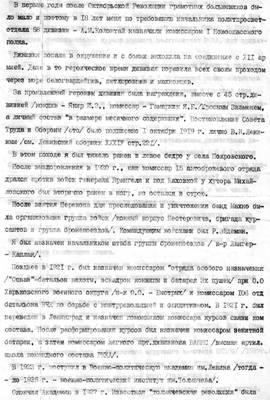


Fast,
Voroshilov Kliment Efremovich,
Wrangel Petr Nikolaevich,
Gamarnik Yan Borisovich,
Grigoriev Nikolay Alexandrovich,
Denikin Anton Ivanovich,
Dronova Elizaveta Danilovna,
Dybenko Pavel Efimovich,
Zhukov Vladimir Alexandrovich,
Ibrahim bey,
Kalinin Mikhail Ivanovich,
Kollontai Alexandra Mikhailovna,
Kolyadinskaya Anna,
Kolyadinsky Viktor,
Kochkin Petr,
Langer-Kaplan,
Lenin (Ulyanov) Vladimir Ilyich,
Makhno Nestor Ivanovich,
Murkin Lev Dmitrievich,
Nesterovich,
Stalin Joseph Vissarionovich,
Eideman (Eidemanis) Robert Petrovich,
Yakir Iona Emmanuilovich
1983
Fund 02 (Б-1) / Inventory 1 / Case Горбунов Петр Максимович
4. Resolution of the Central Executive Committee of the USSR dated April 16, 1935 on awarding workers of the fishing industry of the Murmansk Territory, published in the magazine “Karelo-Murmansk Territory” No. 4 for 1935, among those awarded the Order of Lenin was the chairman of the Murmansk regional executive committee and city council P.M. Gorbunov.
1 лист, 1 изображение, электронная копия

Gorbunov Petr Maksimovich,
Andrianov Fedor Ivanovich,
Svetov Mikhail Sergeevich,
Abramov-Borovitsky Abram Izrailevich (Ivanovich),
Bogachev Ivan Borisovich,
Kuzin I.P.,
Egorov Alexander Alexandrovich,
Mamonov P.T.,
Gashev F.Yu.,
Peterson Ya.I.,
Petrushikhin E.A.,
Mavrin N.R.,
Korolkov Gennady Pavlovich,
Luchkin P.S.,
Romanov Yakov Georgievich,
Arkhipov P.I.,
Levkin G.F.,
Kalinin Mikhail Ivanovich,
Akulov Ivan Alekseevich,
Mikoyan Anastas Ivanovich (Ovanesovich)
1935
Fund 02 (Б-1) / Inventory 1 / Case Демьянова Елена Дементьевна
5. A copy of the letter from Demyanova E.D. dated 07/09/1938 addressed to M.I. Kalinin. with a request for permission to return to Leningrad or to the city of Kalinin, where she lived from 1916 to 1930. Extract from case No. 62839 on E.D. Demyanova, sheet 14. (attached file)
1 лист, 1 изображение, текстовый файл, файл (присоединённый)
Fund 02 (Б-1) / Inventory 1 / Case Мительман Роза Яковлевна
5. Article by the initiative group "The Last Address" in St. Petersburg about Mitelman R.Ya. and Pines D.M., who were shot in 1937, and about the installation of a memorial plaque on the house where he lived as part of the "Last Address" project 02.07. 2017. (attached file)
3 листа, текстовый файл, файл (присоединённый)
Fund 03 (Б-2) / Inventory 1 / Case Юрасов Дмитрий Геннадьевич
5. Yurasov D. “The mechanism of terror” (introductory article “A few words about the collector” by I. Polotsk) in the magazine “Daugava”. 1989, no. 4.
9 листов, 6 изображений, газетная/журнальная вырезка






Abakumov Viktor Semenovich,
Berggolts Olga Fedorovna,
Beria Lavrenty Pavlovich,
Braverman,
Voroshilov Kliment Efremovich,
Gorkin Alexander Fedorovich,
Yezhov Nikolay Ivanovich,
Zhdanov Andrey Alexandrovich,
Zakovsky Leonid Mikhailovich,
Zakrzhevskaya Taisiya Vladimirovna,
Kaganovich Lazar Moiseevich,
Kalinin Mikhail Ivanovich,
Kirov Sergey Mironovich,
Komarov Vladimir Ivanovich,
Kondratiev Nikolay Dmitrievich,
Krylenko Nikolay Vasilievich,
Lesnov,
Litvin Mikhail Iosifovich,
Litoshenko Lev Nikolaevich,
Molotov Vyacheslav Mikhailovich,
Nikolaev Leonid Vasilievich,
Ordzhonikidze Grigory Konstantinovich (Sergo),
Polotsk Ilan,
Popkov Petr Sergeevich,
Putintsev Arseny Vladimirovich,
Ravich Antonina Filippovna,
Ravich German Vladimirovich,
Ravich Svetlana Vladimirovna,
Ramzin Leonid Konstantinovich,
Rokossovsky Konstantin Konstantinovich (Ksaverevich),
Solzhenitsyn Alexander Isaevich,
Soloviev Nikolay Vasilievich,
Sositsky Lev Ilyich,
Stalin Joseph Vissarionovich,
Tolmazov Andrey Ilyich,
Chayanov Alexander Vasilievich,
Shatsky Nikolay Nikolaevich,
Yurasov Dmitry Gennadievich,
Yagoda Genrikh Grigorievich,
Yaroslavsky Emelyan Mikhailovich
1989
Fund 02 (Б-1) / Inventory 1 / Case Радков Михаил Викторович
5. Memories of Vinogradova M.M. about her repressed parents Radkov M.V. and Zak E.A., written in 2006.
4 листа, 4 изображения, распечатка компьютерного набора




Vinogradova Maya Mikhailovna,
Zak Elizaveta Alexandrovna,
Nesterenko Maria Petrovna,
Radkov Mikhail Viktorovich,
Rychagov Pavel Vasilievich,
Postyshev Pavel Petrovich,
Olenchenko Leonty Pavlovich,
Toder Emmanuel Ilyich,
Vasilkov Grigory Semenovich,
Kantorovich Zinovy Ilyich,
Karpov-Golub Miron Moiseevich,
Kushnir A.S.,
Maryagin Georgy Alexandrovich,
Kaganovich Lazar Moiseevich,
Nikolenko,
Kotovsky Grigory Ivanovich,
Radkov Yuri Mikhailovich,
Pristavkin Anatoly Ignatievich,
Krupskaya Nadezhda Konstantinovna,
Kalinin Mikhail Ivanovich,
Glebov Vladimir Lvovich,
Vinogradov Kirill Borisovich,
Pisarev Yuri Alekseevich,
Schoolboy Galina Izrailevna
2006
Fund 02 (Б-1) / Inventory 1 / Case Котлов Сергей Иванович
7. Article by E. Kuznetsova “Name me such a monastery...” in the newspaper “Industrial Karaganda” from 02/19/1989 about the Kotlov family and the fate of the repressed Kotlov S.I.
1 лист, 1 изображение, ксерокопия

Fund 017 (К-1) / Inventory 1 / Case КОМАКАДЕМИЯ. Кашарский Григорий Васильевич
7. The indictment in the investigative case No. 23262 on charges of Kasharsky G.V. dated 11/27/1937.
3 листа, 3 изображения, ксерокопия машинописи

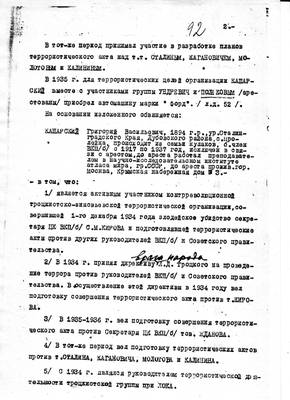

Zhdanov Andrey Alexandrovich,
Zaidel Grigory Solomonovich,
Kaganovich Lazar Moiseevich,
Kalinin Mikhail Ivanovich,
Karpov Georgy Grigorievich,
Kasharsky Grigory Vasilievich,
Kirov Sergey Mironovich,
Molotov Vyacheslav Mikhailovich,
Polyakov Apollon Borisovich,
Sorokin Alexander Ivanovich,
Stalin Joseph Vissarionovich,
Trotsky Lev Davidovich,
Undrevich Vaclav Stanislavovich,
Fendel Isaac Solomonovich,
Shapiro-Daikhovsky Natan Evnovich,
Eskin Mikhail Zakharovich,
Yakushev Sergey Kirillovich
1937
Fund 017 (К-1) / Inventory 1 / Case 059
7. Record of interrogation of Undrevich V.S. dated 09/16/1937.
Record of interrogation of Undrevich V.S. dated 09/16/1937. , pdf
8 sheets, photocopy of a typewritten copy.
8 листов, 8 изображений, ксерокопия машинописной копии





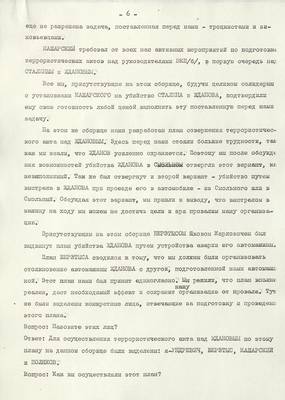


Undrevich Vaclav Stanislavovich,
Trotsky Lev Davidovich,
Kasharsky Grigory Vasilievich,
Sorokin Alexander Ivanovich,
Rezunov Mikhail Denisovich,
Grishenkov Ivan Pavlovich,
Zaidel Grigory Solomonovich,
Kartashev Grigory Mikhailovich,
Eskin Mikhail Zakharovich,
Berztys (Berstys) Yakov Karlovich,
Kirov Sergey Mironovich,
Stalin Joseph Vissarionovich,
Zhdanov Andrey Alexandrovich,
Bukhanov Petr Artemyevich,
Serebryakov Valentin Markovich,
Slavin Ilya Venediktovich,
Rubinstein Boris Moiseevich,
Molotov Vyacheslav Mikhailovich,
Kaganovich Lazar Moiseevich,
Kalinin Mikhail Ivanovich,
Tarasov Mikhail Silantievich (Selatievich),
Karpov Georgy Grigorievich,
Zavilovich Noy Aronovich,
Yakushev Sergey Kirillovich,
Pashukanis Evgeniy Bronislavovich,
Slonim G.,
Prede Robert Janovich (Jakovlevich),
Polyakov Apollon Borisovich,
Sergeev,
Nikolaev Leonid Vasilievich,
Kotolynov Ivan Ivanovich
1937
Fund 017 (К-1) / Inventory 1 / Case 012
9. Protocol of interrogation of Fedorov S.V., conducted by an employee of the 5th department of OKRO GPU on 07/16/1926.
3 листа, 3 изображения, ксерокопия



Fund 05 / Inventory 1 / Case Полоз Рада Михайловна. Т. 1
9. Biographical information about Poloz M.N., written by Poloz R.M.
10 листов, 10 изображений, распечатка компьютерного набора
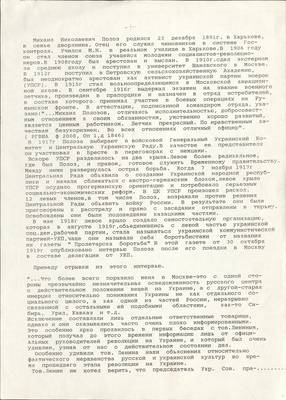
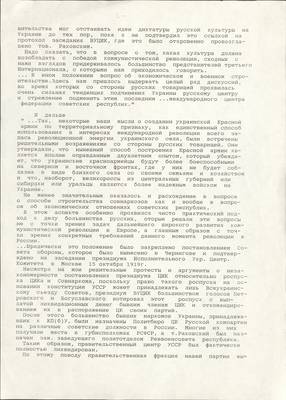
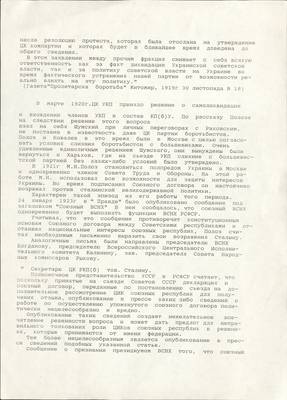
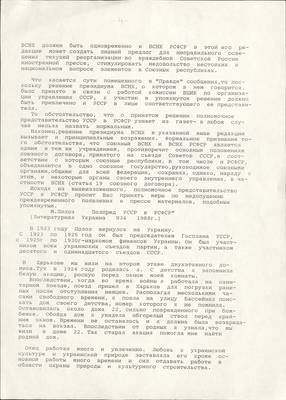
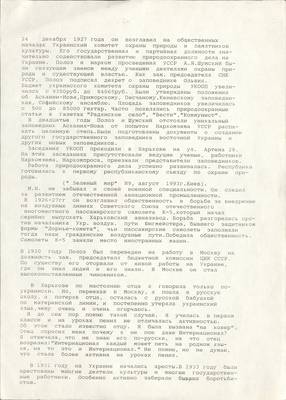
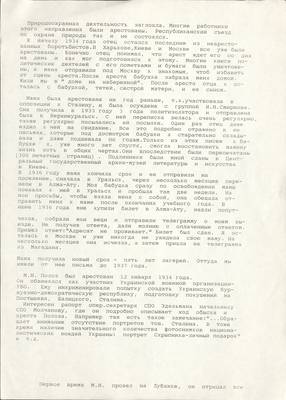
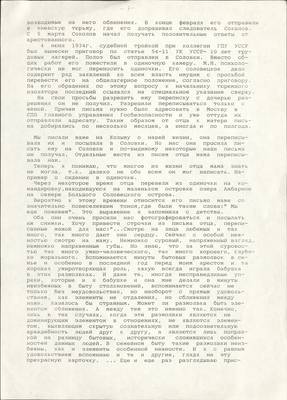
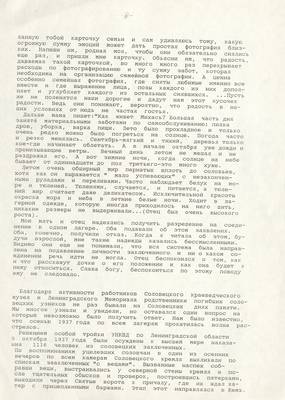
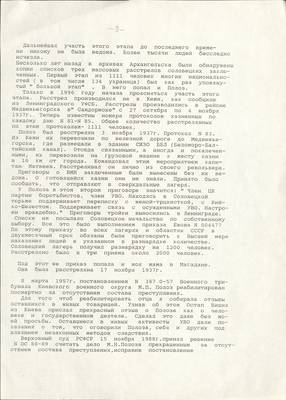
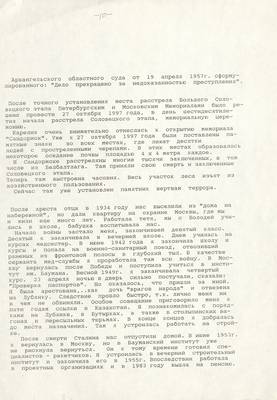
Poloz Mikhail Nikolaevich,
Poloz Rada Mikhailovna,
Lenin (Ulyanov) Vladimir Ilyich,
Rakovsky Christian Georgievich,
Petrovsky Grigory Ivanovich,
Boguslavsky Mikhail Solomonovich,
Shumsky Alexander Yakovlevich,
Kovalev Lev Borisovich,
Bogdanov Petr Alekseevich,
Kalinin Mikhail Ivanovich,
Rykov Alexey Ivanovich,
Stalin Joseph Vissarionovich,
Yungmeister Vasily Yulievich,
Myagkova Feoktista Yakovlevna,
Myagkova Tatyana Ivanovna,
Smirnov Ivan Nikitich,
Postyshev Pavel Petrovich,
Balitsky Vsevolod Apollonovich,
Edelman Solomon Davydovich,
Molchanov Georgy Andreevich,
Skripnik (Skrypnik) Nikolai Alekseevich,
Sokolov,
Matveev Mikhail Rodionovich,
Kiiko-Shelest Petr Samsonovich,
Yezhov Nikolay Ivanovich,
Gubenko Pavel Mikhailovich,
Myagkov Vladimir Alexandrovich
Fund 03 (Б-2) / Inventory 10 / Case Дело по обвинению Пименова Р.И. и других, в 10 томах, т. 6
9. Pimenov R.I. What is socialism? With the inscription: “This unfinished manuscript was seized from me during a search on the night of March 26, 1957.” Case sheets 105-128.
35 листов, 35 изображений, ксерокопия рукописи



































Pimenov Revolt Ivanovich,
Lenin (Ulyanov) Vladimir Ilyich,
Stalin Joseph Vissarionovich,
Trotsky Lev Davidovich,
Bukharin Nikolai Ivanovich,
Zinoviev (Radomyslsky) Grigory Evseevich,
Bubnov Andrey Sergeevich,
Lomov-Oppokov Georgy Ippolitovich,
Dzerzhinsky Felix Edmundovich,
Milyutin Vladimir Pavlovich,
Kamenev Lev Borisovich,
Krylenko Nikolay Vasilievich,
Plekhanov Georgy Valentinovich,
Rykov Alexey Ivanovich,
Slepkov Alexander Nikolaevich,
Bogushevsky Vladimir Sergeevich,
Obolensky Valerian Valerianovich,
Smilga Ivar Tenisovich,
Rakovsky Christian Georgievich,
Shklovsky Grigory Lvovich,
Kuchmenko Nikolay Osipovich,
Khrushchev Nikita Sergeevich,
Mikoyan Anastas Ivanovich (Ovanesovich),
Uglanov Nikolay Alexandrovich,
Zatonsky Vladimir Petrovich,
Kosior Stanislav Vikentievich,
Ordzhonikidze Grigory Konstantinovich (Sergo),
Kalinin Mikhail Ivanovich,
Mrachkovsky Sergey Vitalievich,
Yaroslavsky Emelyan Mikhailovich,
Bakaev Ivan Petrovich,
Molotov Vyacheslav Mikhailovich,
Tomsky Mikhail Pavlovich,
Koltsov (Fridlyand) Mikhail Efimovich
1957
Fund 02 (Б-1) / Inventory 1 / Case Дземянович Адам Людвигович
10. A copy of the article by Dzemyanovich A.L. “My Life”, published in the newspaper “On Rails” No. 99-100 (483-484) dated November 7, 1934. L. No. 32-1/3 D 135023-94 TsGAIPD. (attached file)
3 листа, текстовый файл, файл (присоединённый)
Dziemyanovich Adam Lyudvigovich,
Schweitzer,
Bitenbinder,
Aksenov,
Shpakovsky,
Lenin (Ulyanov) Vladimir Ilyich,
Martov Yuliy Osipovich, Lev Martov (real name Yuliy Osipovich Tsederbaum),
Volodarsky V. (Moisey Markovich Goldstein),
Chernov Viktor Mikhailovich,
Dziemyanovich Stanislav Adamovich,
Neumann,
Ananichev,
Kornilov Lavr Georgievich,
Yudenich Nikolai Nikolaevich,
Dziemyanovich Leon Adamovich,
Voivode Ivan Mikhailovich,
Bunchuk,
Glebov-Avilov Nikolay Pavlovich,
Kalinin Mikhail Ivanovich,
Grekov Ivan Ivanovich
1934
Fund 017 (К-1) / Inventory 1 / Case Владимиров Роман Владимирович
10. The testimony of the accused Vladimirov P.The. dated 23.09.1937.
28 листов, 28 изображений, ксерокопия машинописной копии, файл (присоединённый)
Abramson,
Averkiev,
Aksenovskiy,
Andreev,
Appolomik,
Bapuhocki Helmet,
Belyaev,
Biskov (Viskov?),
Borozdin,
Burmistenko,
Bushuev Pavel Ivanovich,
Vaishlya Joseph Stanislavovich,
Weisman Aron,
Venizhel,
Vershkov Petr Afanasyevich,
Wigder,
Viskovnya,
Vladimirov Roman Vladimirovich,
Voroshilov Kliment Efremovich,
I'll call,
Gaitskhoki Solomon Samuilovich,
Galkin,
Golovin Adolf,
Smut,
Gribkov,
Gryadinsky Fedor Pavlovich,
Gurevich,
Gusarov,
Gusev L.,
Dolotov,
Dryazgov,
Ershov,
Efimov,
Live Meer (Miron) Zelmanovich,
Zhominok,
Zinoviev (Radomyslsky) Grigory Evseevich,
Irklis Petr Andreevich,
Ishevsky,
Kalinin Mikhail Ivanovich,
Kaplan Efim Borisovich,
Kaplan S.,
Kaplanov,
Karpov Georgy Grigorievich,
Kasparov,
Kirik,
Konovalov Alexey,
Konovalov M.,
Korolenko Petr Ivanovich (Korzhenko*),
Kosarev Alexander Vasilievich,
Krivolapova,
Kudelin,
Kudryavtseva G.K.,
Laukkainen (Laukanen),
Laukkasli,
Liskier Moses Lazarevich,
Liechstein,
Likhshtim Vladimir,
Lozinskaya,
Maksimov,
Marinushkin,
Martyanov Pavel,
Matselevich Nikolai Iosifovich,
Melkishev,
Menshutin Ivan Ivanovich,
Mucinek,
Nabedrik,
Nazarov Mikhail Vasilievich,
Nizovtsev Petr Leontievich,
Nikitin Ivan,
Nikolsky Mikhail Nikolaevich,
Oshleis,
Peril Benzian Aronovich,
Perillo,
Pozern Boris Pavlovich,
Pauline,
Polyakov Nikolay Andreevich,
Pupin,
Radomyslskaya Liya Aronovna,
Rzhavin Alexander Nikitich,
Smooth,
Rodenkov Vasily Vasilievich,
Rolling,
Rugavin,
Svetikov (Tsvetikov?) E.,
Svetlov Efim Semenovich,
Seredokhin Sergey Karpovich,
Serov Sergey Pavlovich (Nikolai?),
Simanovsky,
Smorodin Petr Ivanovich,
Sobolev Sergey Mikhailovich,
Soldiers,
Sorokin Alexander Ivanovich,
Spirenkov,
Starushchenko Panteley Zakharovich,
Surov Pavel Nikolaevich,
Tenisons Karl Yakovlevich,
Tubanov Petr,
Ugarov Alexander Ivanovich,
Fayvilovich Grigory Yakovlevich,
Fedorov,
Fedorov Alexander Ivanovich,
Fomin,
hoshin,
Tsarkov Fedor Filatovich,
Suitcases,
Shamrey Nikolai Konstantinovich,
Shaposhnikova Ludmila Kuzminichna,
Shashaev,
Sheinberg,
Shereshkov,
Shershevsky Nikolai (Karp) Sergeevich (Rafailovich),
fur coat,
Shcherbakov,
Yurevich
1937
Fund 02 (Б-1) / Inventory 1 / Case Драбкина Елизавета Яковлевна
12. Story by E.Ya. Drabkina “The Year 1921”, dedicated to the Kronstadt uprising of 1921, published in the magazine “Youth” for 10.1987, pages 7-22. (8 sheets, original).
8 листов, 1 изображение, оригинал, файл (присоединённый)

Belenky (Khatskelevich) Grigory Yakovlevich,
Bubnov Andrey Sergeevich,
Vasiliev Pavel Dmitrievich,
Vershinin Sergey Stepanovich,
Vilken Pavel Viktorovich,
Viren Robert Nikolaevich (Robert Reinhold von Wiren),
Voroshilov Kliment Efremovich,
Drabkina Elizaveta Yakovlevna,
Dybenko Pavel Efimovich,
Kalinin Mikhail Ivanovich,
Klebanova Asya,
Kozlovsky Alexander Nikolaevich,
Kuzmin Nikolay Nikolaevich,
Cooperman Riva.,
Lashevich Mikhail Mikhailovich,
Lemkova Lelya,
Lenin (Ulyanov) Vladimir Ilyich,
Lepse Ivan Ivanovich,
Lindeman,
Petrichenko Stepan Maksimovich,
Putna Vitovt Kazimirovich,
Romanenko,
Rukhimovich Moisey Lvovich,
Skvortsov-Stepanov Ivan Ivanovich,
Sladkov Ivan Davydovich,
Syrkin Leonid Naumovich,
Turin,
Tukhachevsky Mikhail Nikolaevich,
Flegontych,
Khristoforov Boris Ignatievich
1987
Fund 02 (Б-1) / Inventory 1 / Case Автономов Александр Дмитриевич
12. Texts of letters of Avtonomov A.D. from imprisonment (1937), prepared by Borkovsky Yu.I. in 1988-1989, and extracts from materials of archival-investigative cases of Avtonomov A.D. No. 6804-P (1936) and No. R-7628 (1937), compiled by Borkovsky Yu.I. in 2000 (attached file)
126 листов, 126 изображений, машинопись, распечатка компьютерного набора

























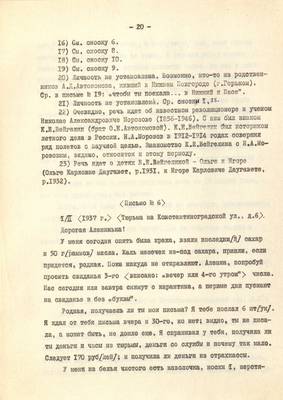
















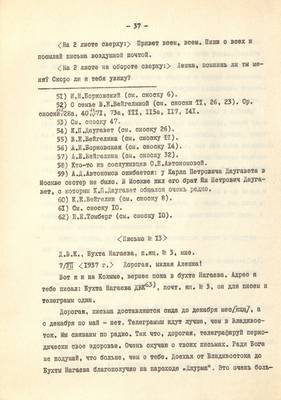










































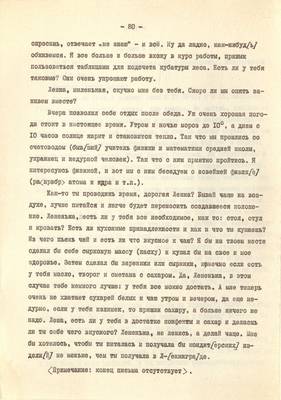












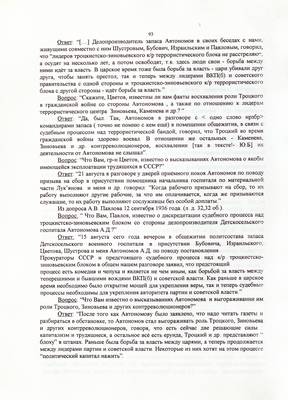










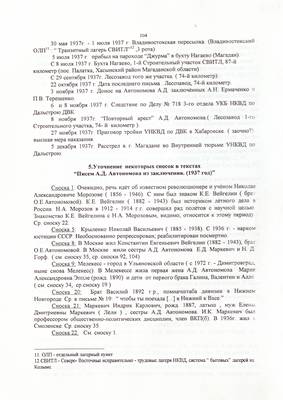
















Avtonomov Alexander Dmitrievich,
Borkovsky Yuri Iosifovich,
Daugavet Olga Karlovna,
Watchmakers,
Markevich (Avtonomova) Elena Dmitrievna,
Gorf (Avtonomova) Nadezhda Dmitrievna,
Potapov M.R.,
Зеленюк Г.Б.,
Кондруш Арнольд Эдуардович,
Израильский М.О.,
Бубович П.В.,
Lukyanov A.M.,
Цветов Г.И.,
Pavlov A.V.,
Шустров И.А.,
Спиро Л.А.,
Автономов Николай Дмитриевич,
Avtonomov Vasily Dmitrievich,
Autonomov Pavel Dmitrievich,
Avtonomova Olga Evgenievna,
Омехин,
Markevich Indrik Karlovich,
Krivenko,
Galushko A.,
Veselkov,
Filippov Ivan Gavrilovich,
Kuzmenkov Ivan Porfirievich,
Vinokurov Ivan Ivanovich,
Gres,
Rumyantsev,
Nazarov,
Morozov Nikolai Alexandrovich,
Krylenko Nikolay Vasilievich,
Veigelin Konstantin Evgenievich,
Epple Maria Alexandrovna,
Soloviev Alexander Vasilievich,
Peshkova Ekaterina Pavlovna,
Daugavet Igor Karlovich,
Borkovskaya Iya Borisovna,
Figner Vera Nikolaevna,
Krupskaya Nadezhda Konstantinovna,
Kalinin Mikhail Ivanovich,
Borkovsky Joseph Napoleonovich,
Borkovskaya (Weigelina) Alexandra Evgenievna,
Борковский Роберт Иосифович,
Veygelina Valentina Evgenievna,
Daugavet Karl Petrovich,
Даугавет Ян Петрович,
Tomberg (Weigelina) Elizaveta Evgenievna,
Томберг Екатерина Артуровна,
Veigelina Anna Evgenievna,
Shcherba Lev Vladimirovich,
Shcherba Tatyana Genrikhovna,
Fedorov,
balls
2000
Fund 02 (Б-1) / Inventory 1 / Case Дземянович (Демьянович) Людвиг Людвигович
13. Extracts from the protocols of interrogations of witnesses from 08/22/1956 to 09/08/1956 in case No. 2846 [in relation to Dzemyanovich L.L.?], with testimony about Dzemyanovich L.L. (attached file)
1 лист, текстовый файл, файл (присоединённый)
Fund 02 (Б-1) / Inventory 1 / Case Извеков Борис Иванович
14. Article by Y. Golovanov “Executioners and victims of “Case No. 555”, published in the magazine “Ogonyok” No. 5, 1992.
2 листа, 2 изображения, ксерокопия




Abakumov Viktor Semenovich,
Altshuller Isaac Konstantinovich,
Amosov Nikolay Mikhailovich,
Artemov Boris Vasilievich,
Artemyev Nikolay Artamonovich,
Akhmatova Anna Andreevna,
Badaev Georgy Fedorovich,
Balashov T.I.,
Basov Mikhail Vasilievich,
Bezikovich Abram Samoilovich,
Beria Lavrenty Pavlovich,
Shadricheva Irina Fedorovna,
Borovlev,
Walter Alexander Filippovich,
Varskoy Evgeniy Ivanovich,
Verbitsky Alexander Dmitrievich,
Verzhbitsky Boris Dmitrievich,
Vinogradov Nikolay Pavlovich,
Vol Sergey Nikolaevich,
Voronov Nikolay Nikolaevich,
Vyshinsky Andrey Yanuarievich,
Georgadze Mikhail Porfirievich,
Glazenap Sergey,
Golovanov Yaroslav Kirillovich,
Denisov Evgeniy Ivanovich,
Zhdanov Andrey Alexandrovich,
Zhuravsky Andrey Mitrofanovich,
Zanin Semyon Fedoseevich,
Zinoviev (Radomyslsky) Grigory Evseevich,
Zoshchenko Mikhail Mikhailovich,
Ignatovskaya Maria Ivanovna,
Ignatovsky Vladimir Sergeevich,
Izvekov Boris Ivanovich,
Inge Lidiya Dzhonovna,
Kalinin Mikhail Ivanovich,
Kapustin Yakov Fyodorovich,
Karovodina L.I. [Lyudmila Ivanovna?],
Kirov Sergey Mironovich,
Kozhemyakin Ivan Alexandrovich,
Korolev Sergei Pavlovich,
Koshlyakov Nikolai Sergeevich,
Koshlyakova Ekaterina Arsenyevna,
Krasovsky,
Krestovsky G.L.,
Kruzhkov Nikolay Fedorovich,
Kruzhkov Stanislav Nikolaevich,
Kubatkin Petr Nikolaevich,
Kuznetsov Alexey Alexandrovich,
Lazutin Petr Georgievich,
Levin Panteleimon Ivanovich,
Legun Sigismund,
Leeb Wilhelm von,
Lenin (Ulyanov) Vladimir Ilyich,
Lyubov Konstantin Alekseevich,
Malenkov Georgy Maximilianovich,
Merkulov Evgeniy Fedorovich,
Mikoyan Anastas Ivanovich (Ovanesovich),
Milinsky Vladimir Ivanovich,
Naumov Valentin Savvich,
Nosov Vladimir Ivanovich,
Ogoltsov Sergey Ivanovich,
Pavlov Ivan Petrovich,
Podchasov Ivan Vasilievich,
Popkov Petr Sergeevich,
Popov German,
Acceleration Lev Emmanuilovich,
Rose Nikolay Vladimirovich,
Rudenko Roman Andreevich,
Ryumin Mikhail Dmitrievich,
Ryabov Mikhail Filatovich,
Sapozhnikov Rostislav Alekseevich,
Semichastny Vladimir Efimovich,
Serov,
Soloviev Nikolay Vasilievich,
Stalin Joseph Vissarionovich,
Strahovich Konstantin Ivanovich,
Suslov N.I. (or N.L.),
Tamarkin Yakov Davidovich,
Titov Leonid Gavrilovich,
Tretetsky Alexander Vladimirovich,
Turkevich Nikolay Gervasievich,
Tukhachevsky Mikhail Nikolaevich,
Ulrich Vasily Vasilievich,
Filippov Andrey Vladimirovich,
Fridman Alexander Alexandrovich,
Kharitonov Ilya Stepanovich,
Chanyshev S.M.,
Chapman Sydney,
Churilovskiy Vladimir Nikolaevich,
Yushkov Leonid Petrovich
1992
Fund 02 (Б-1) / Inventory 1 / Case Торф Израиль Файвушевич
17. Draft letter to Torf I.F. Kalinin M.I. dated 07/03/1939 with a request to consider his application.
1 лист, 1 изображение, оригинал

Fund 02 (Б-1) / Inventory 1 / Case Вахламов Александр Николаевич
18. Group photo of participants (?) of the Congress of the CPSU (b), [8th in the first row (from left to right) - Kalinin M.I.]
1 лист, 1 изображение, фотокопия

Fund 02 (Б-1) / Inventory 1 / Case Журавский Андрей Митрофанович
33. Article by Karpenko V. “Disgraced Professor (On the 100th anniversary of the birth of A.M. Zhuravsky)” in the newspaper of the St. Petersburg Mining Institute “Gornyatskaya Pravda” No. 19-20 dated December 29, 1992, p.7.
1 лист, оригинал
Bogdanova Nina Alexandrovna,
Viktorovich Petr Valentinovich,
Golovanov Yaroslav Kirillovich,
Zhuravskaya Evgenia Mitrofanovna,
Zhuravskaya Ekaterina Ivanovna,
Zhuravsky Alexander Mitrofanovich,
Zhuravsky Andrey Mitrofanovich,
Zhuravsky Mitrofan Petrovich,
Zhuravsky Sergey Mitrofanovich,
Kalinin Mikhail Ivanovich,
Karpenko V.V.,
Koshlyakov Nikolai Sergeevich,
Rose Nikolay Vladimirovich,
Solzhenitsyn Alexander Isaevich
1992
- 1
Fund 02 (Б-1) / Inventory 1 / Case Цыганов Корнилий Андреевич
42. Letter from K.A. Tsyganov dated June 21, 1943 from Nizhny Tagil, Sverdlovsk Oblast, to his niece Lyusya about receiving postcards from her, about his work as a carpenter, about being released from work on June 16, 1943 due to illness, about not having received parcels for a long time, about sending statements to Stalin, Kalinin, Beria, the USSR Prosecutor and the NKLP USSR.
1 лист, 2 изображения, электронная копия
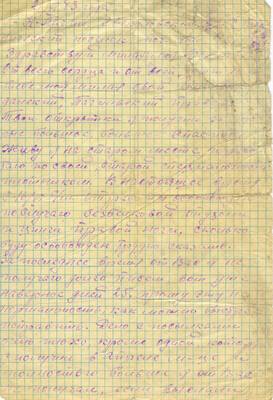
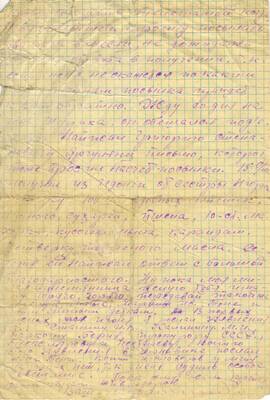
Tsyganov Kornily Andreevich,
* Lucy,
Yargulyants Grigory Stepanovich,
Tsyganov Alexander Andreevich,
Koshkina Anna Andreevna,
Spirina Maria Ivanovna,
Medvedeva Anna Illarionovna,
Tsyganova Antonina Ivanovna,
Stalin Joseph Vissarionovich,
Kalinin Mikhail Ivanovich,
Beria Lavrenty Pavlovich,
Alexandrov,
Pekhterev
1943
Fund 02 (Б-1) / Inventory 1 / Case Цыганов Корнилий Андреевич
43. Letter from K.A. Tsyganov dated June 21, 1943 from Nizhny Tagil, Sverdlovsk Region, to Maria Ivanovna Spirina about his work as a carpenter, about scurvy and a swollen leg, about waiting for a parcel and Shura's arrival, about gratitude for the support of his family, about applications sent for a review of the case and with a request for a parcel of vegetables.
1 лист, 2 изображения, электронная копия
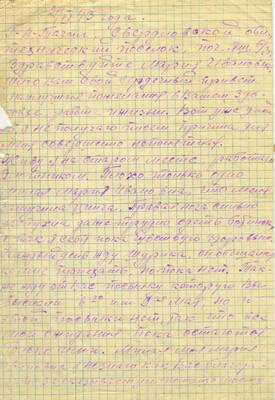
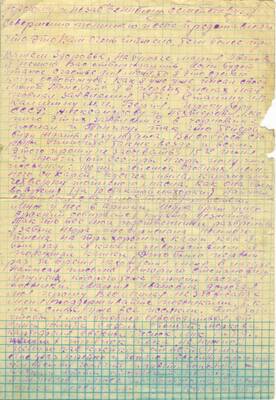
Tsyganov Kornily Andreevich,
Spirina Maria Ivanovna,
Tsyganov Alexander Andreevich,
Tsyganova Antonina Ivanovna,
Stalin Joseph Vissarionovich,
Pekhterev,
Kalinin Mikhail Ivanovich,
Beria Lavrenty Pavlovich,
Alexandrov,
Koshkina Anna Andreevna,
Tsyganov Arseniy Andreevich,
Yargulyants Grigory Stepanovich
1943
Fund 017 (К-1) / Inventory 1 / Case Владимиров Роман Владимирович
45. Decree of the Presidium of the Leningrad City Court dated February 11, 1956 in the case of Vladimirov R.V. on the abolition of the Resolution of the special meeting of the NKVD of the USSR of 01/28/1938 in relation to Vladimirov R.V.
4 листа, 4 изображения, ксерокопия




Abramov-Borovitsky Abram Izrailevich (Ivanovich),
Bogdanov Mikhail Fedorovich,
Bushuev Pavel Ivanovich,
Vladimirov Roman Vladimirovich,
Voroshilov Kliment Efremovich,
Grodzenchik Grigory Efimovich,
Eremenko,
Zinoviev (Radomyslsky) Grigory Evseevich,
Irklis Petr Andreevich,
Isakova Nina Sidorovna,
Kalinin Mikhail Ivanovich,
Mochalov,
Nazarov Mikhail Vasilievich,
Pikina Valentina Fedorovna,
Polyakov Nikolay Andreevich,
Semenov Alexey Petrovich,
Serov Sergey Pavlovich (Nikolai?),
Surov Pavel Nikolaevich,
Trofimovsky Vasily Yakovlevich,
Freinberg Boris Vasilievich,
Tsypin I.G.,
Shpankova
1956
Fund 02 (Б-1) / Inventory 1 / Case Цыганов Корнилий Андреевич
52. Letter from K.A. Tsyganov, dated March 19, 1944, from the village of Krasny Kamen, Nizhny Tagil, Sverdlovsk Oblast, to his wife, A.I. Tsyganova, about sending postcards to all relatives and a statement to the Central Committee of the All-Union Communist Party (Bolsheviks) requesting that the remaining term of his imprisonment be replaced by dispatch to the front, about his health, which had improved thanks to the parcels, about a visit to the Tagilstroy administration for approval of the glass factory project he had developed, and with a request to continue to do everything possible to review his case.
2 листа, 4 изображения, электронная копия
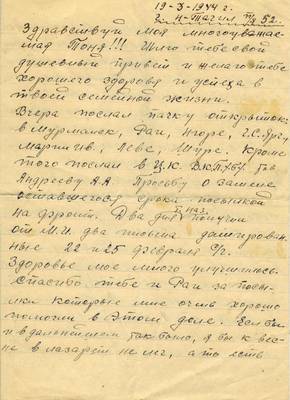
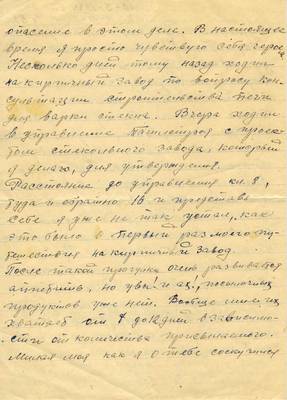
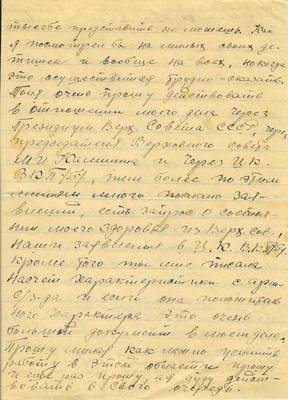
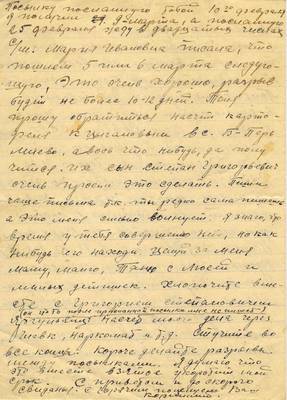
Tsyganov Kornily Andreevich,
Tsyganova Antonina Ivanovna,
Shipileva Raisa Andreevna,
Koshkina Anna Andreevna,
Yargulyants Grigory Stepanovich,
Spirina Maria Ivanovna,
Tsyganov Lev Kornilievich,
Tsyganov Alexander Andreevich,
Andreev Andrey Andreevich,
Kalinin Mikhail Ivanovich,
Tsyganov Stepan Grigorievich,
Medvedeva Anna Illarionovna,
Meshcheryakova Tatyana Ivanovna,
* Lucy
1944
Fund 02 (Б-1) / Inventory 1 / Case Цыганов Корнилий Андреевич
62. Letter from K.A. Tsyganov, dated June 3, 1944, from the village of Krasny Kamen, Nizhny Tagil, Sverdlovsk Oblast, to his wife, A.I. Tsyganova, about Marusya's inability to visit her because she was denied entry, and about Shura's promise to help; about his frequent writing, but apparently the letters are getting lost; about the completion of work on the plant project and his possible trip to the Ivanovo Oblast on a special assignment; about sending another application, addressed to M.I. Kalinin, about being sent to the front, and with a request to continue efforts to review his case.
2 листа, 4 изображения, электронная копия
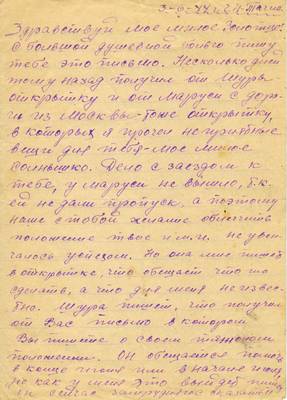
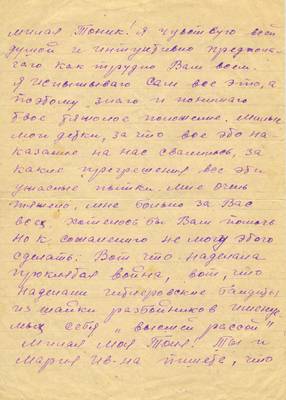
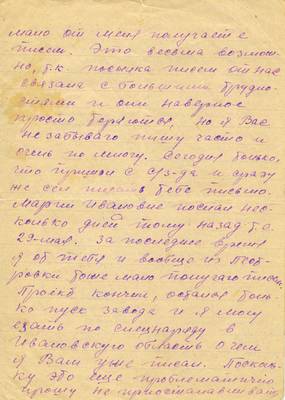
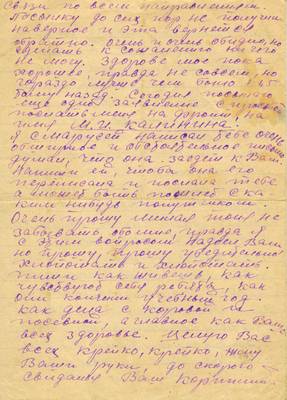
Documents
Link copied to clipboard